#it's like... not even anyone in specific. original characters but not even my pre-established cast of exisitng characters
Text
utilizing all of my willpower in a daunting battle against The Fixations just to get basic household tasks done, i am very brave
#currently in a 'pace around my house for 3 hours staright talking to myself making up character scenarios in my head' phase#which is good because often that is literally how I write and get writing ideas like things start as concepts#and are only fleshed out once I spend hours talking to myself in different voices trying out dialogue and noting down the words#and situations that are the most interesting out of my daydream walkabout freakshow improv acting session but#this is BAD actually when I have 800 other things to do#I couldnt even eat dinner I just wanted to go in the other room and walk around talking to myself#which just happens#I think it's part of the natural cycle of my creativity or what the hell ever like I just.. get Like That#once every few months I become obsessively fixated on wanting to spend all of my time talking to myself like.. idk#maybe just as a way of processing ideas and stuff that have been floating around in my head for a while or somehting#then after a week or so of constantly having to fight the urge to spend all day talking to myself it's like my brain has gotten it out of#its system and I can function again#but for those few days lol#yesterday I made free time to sit and watch a show that I like and I was literally like.. no... I cant even get into the show I dont#care about this.. I would rather pace the living room and act out imaginary people#Which I know some people daydream about exisitng media characters or like their ships or something like this explicitly is not that#it's like... not even anyone in specific. original characters but not even my pre-established cast of exisitng characters#from the various things I'm writing. I just mean I literally walk around having random interactions#Like I'm playing DnD and I'm the DM and also all of the players hiknjk#but also I'm up walking around acting everything out physically and speaking so its maybe more like LARPing#but everything is just random on the spot. like just testing things out. what if I were these 5 random people off the top of my head#in this random scenario off the top of my head. is that anything? huh? then I debate with myself if it is or not#also one of those aituations where having someone spying on you would be more funny than creepy like.. * throws a punch* *also falls on the#ground because I am both the puncher and the person getting punched* *quickly rises and dashes across the room bevause I'm also a third pers#on who's just a witness* * eating a piece of toast while frantically emoting towards a blank spot on the wall#* etc. and so on and so on gybjh#also sadly yes I have super aphantasia I cannot see shit in my head this is probably why I have to physically act out all imagined#scenarios instead of just visualizing them. rip to people who can silently zone out lost in their imaginations but I'm different (WORSE)#ANYWAY I have a ton of projects right now like a game being finished and the giant worldbuilding videos and costumes and all of this stuff#bad timing to get sucked into the vortex of one of my many evil wizard afflictions that manifests once every few months
14 notes
·
View notes
Note
I think I might just be an idiot but could you explain to me why every Sondheim Stan on this website hates girlboss company with a fiery passion? Not defensive or righty just genuinely curious
well, to put it shortly, it’s complicated. see, company is inherently a poor choice for gender bending because of its messages and themes. yes, company is a musical about marriage and loneliness, but to leave it at just those things would be a discredit to the show’s whole scope. company is, at its core, a commentary on a very certain kind of upper middle class, heteronormative, white, urban society. through the character of robert, the audience is led to a place where the absurdities of their world are spotlighted. this method relies on the audience carrying a pre-established set of social norms and then laughing at them (or wincing at them). part of company’s endurance is its ability to be continually relevant as time passes, certain expectations and understandings remain the same.
this is going to get really long. if any other blog members (or anyone else) want to add anything, go ahead and reblog this post! more under the cut.
it’s easy to think that switching the gender of the main character from male to female would modernize company’s content, but actually that just complicates things further and not in a good way. bobby is transformed into bobbie without any consideration of how that would actually change the show’s complete narrative. bobbie’s resulting characterization ends up feeling unnatural. director marianne elliott attempts to resolve that by throwing an additional thread about bobbie’s relationship problems stemming from concerns about her “biological clock” (being childless at 35? heresy!). making a primary female character’s primary conflict related to childbearing only makes the characterization more convoluted and reductive.
in addition to just issues surrounding bobbie, there are issues with gender bending the rest of the cast while also holding onto a heteronormative narrative for its lead. i’m not sure if you’ve watched the bootleg of 2020 company but the other gender issues are also a total bust. the only couple which retains the original dynamic for its pair is sarah and harry. for peter & susan and david & jenny the roles in the relationships are switched. this makes for really strange and unnatural feeling scenes. david & jenny’s scene suffers the worst from this since a domineering wife and passive husband does not offer the same (sad) commentary that the reverse does.
making paul & amy into paul & jamie is cute but ultimately feels like performative woke points since amy being a woman feeling anxiety over being pressured into marriage is integral to the original company’s storyline. watching amy overcome her anxiety about committing to a relationship marks a turning point in robert’s self reflection, although amy’s specific anxiety and expression of it is distinctly cis feminine.
here’s one i don’t have a lot of explanation for: to keep bobbie straight, instead of propositioning bobbie herself, joanne offers bobbie her husband larry which both doesn’t make sense at all and is more than a little concerning.
i feel like i’m using too many words here so in short: the boyfriends aren’t fun at all. unlike the girlfriends, they all come off a bit strange in a bad way. male april is an idiot, male kathy makes no sense, and male marta seems like a male feminist mansplainer.
BASICALLY, the actual attempts to gender bend the show are done extremely badly and the result is a show that feels messy and directionless slapped with a big fat label of “look! i’m woke now!” ignoring that the original company is already extremely progressive in its criticisms.
separate from those issues, even if the changes had been made with the most thoughtful of care, the pacing of 2020 company is abysmal. the scenes are rushed through, as if they can’t even trust the audience to pay attention when people aren’t singing. the actors try their best, but they aren’t given any time to make interesting choices or convey... well, anything?
a lot of us love company deeply and were excited to see it brought back to broadway again. however, 2020 company ended up being more than disappointing, it completely threw up a middle finger to everything the original show stood for and everyone who loved it. hope this could explain some of our issues with it. if you want to read more (somehow), this is the review that i wrote right after watching 2020 company for the first time last year. it’s pretty dated but does go into more depth with my issues with the characterization.
if you want to speedrun hating 2020 company just listen to this song from the 2018 london cast album (the same production before it transferred to broadway)
i’ll take “it’s larry loser!!!″ over “you dirty feminist!!!” any day!
#i knew this was going to be a long post and well#i had to cut myself short!!!#whaddahell#asks#admin fosca#one man pr team right here <3#company musical
56 notes
·
View notes
Text
I’m steadily getting some more ffxiv followers, so I wanted to throw a misc note rundown list on Hayato that can help spark some potential ideas! because GOD do I want to write them and plot with them.
Hayato is intended to be seen as a side NPC who exists completely separated from whatever the warrior of light is up to. While MSQ does offer chances to cross paths with them, their whole entire being and story is completely separated from the main cast and NOT dependent upon them. They are not an original companion or scion. Thus they do not go to the first and they do not go to a LOT of places the WoL does. They simply exist in this world, want to stick to their own thing, and that’s that. But hey, they’re someone who can be hired on as a contact to do some stuff WoLs normally cannot do, which is always a good option for ideas and such 👀
Basically for WoLs, Hayato is a cryptid and it can either be implied they saw them around with the scions before in passing until they left in the hw patches, and they’re someone that was crossed paths with in Kugane in stb in particular who ended up going to Doma (did not go to the steppe) and Ala Mhigo. They’re also taking part of the Ilsabard contingent in ew. That’s bare bones basic info if people have no desire to work off more and get into specific arrangements and potential pre-established dynamics, but I am always, always up for planning and discussing more in-depth info with specific WoL characters, other standalone OCs like them, and canon characters. Just please keep in mind that when it comes to RP itself and timelines/verses there, I prefer to write Hayato from stb onward.
So outside of certain specifics, I do very much have my own sort of default worldstate for them that’s intended to be incredibly flexible to work in other characters via RP and such. The only canon character-related specifics I stick to are Thancred being the one who first looped Hayato into joining the scions, Hayato training under Yugiri during ARR patches and HW, and them going with her and Gosetsu to Kugane and serving as one of Yugiri’s contacts until the liberation of Ala Mhigo. Even that said, when it comes to RP with such characters I will not assume dynamics, force history/specific story bits I came up with on my own unless discussed as I don’t want to force anything onto anyone.
This is for when I add her and applies only to my specific muse of her, but Hayato is one of Tataru’s sources. During Hayato’s brief time working under the scions, she became like, the only person there at the time they respected and felt to be of genuine and competent character. During hw they actually gave her info on the heretics, which helped spark a more closer working-related relationship that carried on into stb when she herself worked out of Kugane.
CW: SEXUAL ABUSE MENTION Also, unless other WoLs explicitly take matters into their hands and live up to true dark knight behavior if they are one, Hayato killed Jifuya (aka Yotsuyu’s sexual abuser that Hien excused god why is that a thing). Sorry, they’re not letting someone like that live at all considering they were in Doma in the stormblood patch content lmao.
I Have put in so much thought about which dungeons Hayato would be available as a trust NPC for and have thought into how they function as a trust NPC but that’s talk for another time.
#[ ooc ];#[ ch: hayato ];#anyway there's a bit more I can't think of rn but this is the most important stuff
4 notes
·
View notes
Photo
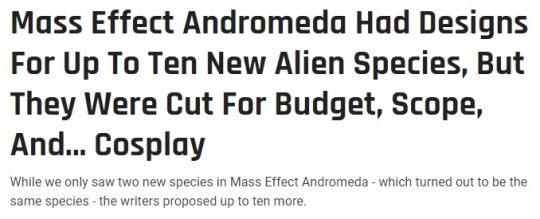
The rest of this post (quotes from the article) is under a cut due to length. [source]
(There are discussions of colonialism under the cut / in the article.)
After speaking to various devs who worked on MEA I’ve learned quite a bit about what happened here. First of all, there were several more species designed for this galaxy. One writer lists having proposed “five or six” new alien types, while another states that the ones BioWare opted for in the end were specifically chosen for being in “cosplay-safe” territory. Another dev mentions that an entire system was constructed just to facilitate communication between species who were indigenous to Andromeda and those who had arrived from the Milky Way. The “species who were indigenous to Andromeda” part is important, given that there were also different ideas for how to handle first contact - making the Pathfinder a violent colonist who shoots first and asks questions later wasn’t something that was set in stone from the get-go.
“I think it was a project that couldn't have possibly lived up to expectations,” Neil Pollner tells me. Pollner was a senior writer on Mass Effect 3 before going on to write parts of Andromeda. “Not just the high bar of the original trilogy, but the logical expectations anyone would have of Mass Effect going to a whole new galaxy. Because the scope of [the first] Mass Effect was so incredibly massive, there was an inherent promise that you'd be getting a massive new experience with a ton of new things in [what was supposed to be the first] Mass Effect Andromeda - new species, new lore, an entire new galaxy at your fingertips, etc.
“But we were only given the budget for two new species, plus the Remnant. Not to mention that we couldn't even include all the Milky Way species. And we weren't going to be able to let you travel throughout the galaxy. This meant that we had to develop the story around some pretty glaring inorganic limitations. So, not only did you get something that felt (and was) much smaller than what you got before, almost everyone playing the game probably had something that they really liked about Mass Effect that just wasn't there.”
Pollner goes on to explain something I mentioned above - that there’s an inherent disconnect between making your character an explorer in a game where the vast majority of gameplay involves killing. “Ryder the explorer should have a challenging and dynamic first contact experience,” he explains. “Instead, you're almost immediately killing kett. So, some very basic pillars just weren't lining up.”
When I ask about the fact that several species had apparently been cut from the game - something I had already learned in previous interviews - Pollner assures me that I had “no idea” of what was dropped in the early days of Andromeda. He also lamented the iconic narrative and branching complexity of earlier BioWare games, stating that he wishes the team had been able to maintain the same level of variation, options, and consequences as the revered RPGs the studio was known for.
“The other BioWare Montreal writers and I were dreaming up and developing things for Andromeda months ahead of Edmonton officially starting the project - i.e. before the budget and scope had been decided/communicated,” Pollner says. “We just knew that we were going to Andromeda, with almost nothing else established, including even when in the timeline it would happen. And we set out to brainstorm and grow ideas that could organically serve that general premise. “That first contact expectation I mentioned? We'd developed ideas for how the player would navigate that. We were working on a process for the Milky Way species to learn how to even communicate with the new alien species. We were developing several additional species for the new galaxy, as well as several different storylines for why the expedition had been undertaken. Most of that pre-development work ended up not being used.”
“I proposed five or six new alien species when Andromeda was in its infancy, and I still think they had a ton of potential,” Hepler says. “[Ex-BioWare writer] Jo Berry came up with a few, too, they were awesome.
“However, I'm pretty sure those ideas are still property of BioWare, so even though I'm 100% certain they won't be used, I can't talk about them without getting some kind of permission.”
Given that Pollner had his own ideas for new species, and that Hepler had “five or six” on top of a “few” more from Berry, it’s reasonable to conclude that concepting was done for up to ten additional species that never made it into Andromeda.
“I remember some early concepts that were pretty out there,” Dorian Kieken tells me. Kieken was a design director at BioWare Montreal for Mass Effect 2 and 3 before being promoted to franchise design director at the beginning of Andromeda’s development. “One of the strengths of the original Mass Effect trilogy is that you can actually cosplay most of the alien characters - except the Hanar, although I wouldn't underestimate the creativity of some cosplayers. The intention in Mass Effect Andromeda was to introduce new races that would still be in the realm of cosplay, which is probably why more crazy concepts were abandoned.”
I was surprised that this was even a consideration, so I followed up. Kieken assures me that after Andromeda’s two new races had been decided on, their evolution of their design gradually went into more “cosplay-safe territory,” with the team consciously steering away from “jellyfish” types of aliens. “In the early development of the game, we explored a lot of new species. I'm not sure why we settled on the specific number that were in the final game, but my guess would be a mix of production reasons and having a reasonable amount of races to deal with knowing we were already bringing quite a few from the Milky Way as well.”
As Pollner mentioned earlier, the team only had the budget for two new species plus the Remnant. On top of that, they weren’t able to bring all of the Milky Way species, which corroborates Kieken’s recollection of why so many species were cut.
Given the context of these conversations - species being cut from Andromeda, first contact being muddled with militance, and even cosplay potential governing alien design - I also ask why, in the devs’ eyes, Andromeda was poorly received in relation to the original trilogy.
“I think it’s more story-related than setting-related,” Kieken says. “Andromeda has strong core gameplay that improved a lot over the trilogy, but the story didn't feel as strong. I didn't connect with the new character cast as much as I did with the original trilogy.
“It's also not a fair comparison as the trilogy is three games, so you have a lot more exposition and time to bond with the characters. That being said, I seem to recall a stronger rollercoaster of emotions in the original trilogy, which I think led to more memorable moments. From the tension of almost blowing up Wrex with your shotgun or gathering everyone on a suicide run, to the lightness of listening to Mordin sing ‘I'm the very model of a scientist Salarian’ or shooting cans with Garrus in the Presidium.”
Pollner also explains why Andromeda was perceived so differently from the original trilogy, citing differences in the amount of time the team were given to make the game, but also noting that the core issue was more systemic in nature.
“I think the thesis statement for why is that the Mass Effect trilogy was an incredibly demanding endeavor,” Pollner says. “The checks that were written for it, the complexity of the experience was insanely massive. The team worked their asses off non-stop for so many years, on back-to-back-to-back games. The prospect of doing the same thing again was not only exhausting to imagine, but totally impractical. Some of the ‘lessons’ learned from the original trilogy are ones that are important for game development but result in the player experience being less. When you're talking about triple-A development, the original trilogy is actually the anomaly, not Andromeda.
“Because I moved on from BioWare after my work on Andromeda was complete, I have no idea what, if any, future plans there might be. At the time of my departure, there were none.”
It’s worth noting that Pollner is clear about Andromeda being better than a lot of people give it credit for. While some of the concerns people had have now been verified by people who worked on the project - that there could have been more species and that the core premise of Ryder the explorer becoming Ryder the killer is inherently flawed - the team still worked hard on delivering an ambitious game within the constraints of what they were given.
“I find the game to actually be pretty darn fun, and once the technical flaws were ironed out, and the initial reactive disappointment faded, the game does stand on its own,” Pollner says. “There's some really good stuff in there.”
[source]
#bioware#mass effect#mass effect: andromeda#video games#colonialism cw#next mass effect#long post#longpost
116 notes
·
View notes
Note
We all know that the Gothel twist was terrible and was only there for the sake of having a twist, but if it absolutely have been done, how should it had happened to make it better narratively?
so. i spent a lot of time kind of mulling over and autopsying s3 and my personal conclusion about what went wrong is that tts hamstrung itself with poor narrative structure. and this is going to be one of those posts where i lead with definitions of the terminology i’m going to use, for the sake of clarity and to avoid any misunderstanding.
to whit:
story is the sum total of every element of a narrative: character, plot, setting, theme, and structure.
character is, of course, the people in the story. it’s “who?”
plot is the events that happen in a story. it’s “what?”
setting is the time and place of the story. it’s “where?” and “when?”
theme is what the story is *about.* it’s “why?”
and then there’s narrative structure, which i think is a little harder to grasp because it’s much more invisible than the other things. but it’s the framework of the story, or the scaffolding. it’s “how?” — how are the characters rendered? how is the setting created? how are the events of the plot strung together along the throughline? how is the story built?
now… in my opinion, character is the single most important element of a story; compelling characters can salvage an otherwise mediocre story, and nothing kills a story faster than uninteresting characters.
but the one thing good characters can’t ultimately compensate for is poor structure. if the construction is shoddy, so to speak, sooner or later, the roof is gonna leak. right? and we can see this happen in tts: s1 and s2 are solid, and then bam! we hit s3 and it’s a mess of bizarre pacing and dropped characters, the feelings and motivations of key players get all wonky, the plot loses focus, and things increasingly feel like they’re happening by authorial fiat. the weak structure of the narrative has failed, and it dragged the entire story down with it.
and we can look back in retrospect and see that, yeah, all of these problems existed before; tts always had odd pacing, always had an issue with maintenance of the supporting cast, always relied more on convenience than a narrative really should. but these things didn’t hit a critical mass until s3.
so what does this have to do with gothel? well,
in and of itself, “gothel is cassandra’s mother!” is not a terrible plot twist. the problem with it is a problem of execution, which is to say, the flaw is in the structure, not the plot.
#1: set-up
plot twists are kind of difficult to pull off well, because you don’t want to blindside people, but you also don’t want to tip your hand too soon. you want to surprise, or maybe even shock—but you don’t want your audience to go, “wait, WHAT? that makes no sense!”
do you remember the whole “ricky’s quest” thing that went on in s2? we were told that there was an important piece of foreshadowing somewhere in s1 or s2 that no one had picked up on yet and there was this whole thing of people trying to figure out what it was, and then… rapunzel’s return aired, and ricky revealed that the answer was “cassandra briefly glances into the shattered mirror in rapunzel’s tower.”
and that, + the fact that we know cass is adopted and doesn’t remember her birth parents, + vague visual similarities, is the entirety of the s1-s2 foreshadowing for cassandra being gothel’s daughter.
which isn’t nothing, i’ll grant you, but for something as major as the gothel twist, for something that profoundly changes the worldview and motivations of one of the main characters to such a degree that she completely changes sides because of it, it might as well be nothing.
gothel is afforded zero narrative importance in s1-s2. rapunzel has one nightmare about her, and some lingering trauma connected to the tower that is explored, and of course tromus briefly uses her image to try to control rapunzel in rapunzeltopia. but gothel herself is a non-entity until she abruptly and without warning becomes the emotional lynchpin of the entire conflict in s3. that’s jarring.
cassandra is a complex character whose apparent motivations for turning against rapunzel are meticulously built up over the course of s2… only for s3 to pull a bait-and-switch, sweep all of that set-up under the rug, and replace it with cassandra’s messed up feelings about gothel’s abandonment. even her ruined hand never gets mentioned again—not by her, not by zhan tiri, not by rapunzel, not by anyone. that’s jarring, too.
to use my own work as a point of comparison here, the bitter snow equivalent of the gothel reveal is cassandra finding out that sirin is her aunt and her parents were innocent. like the gothel twist, learning that information profoundly changes how cassandra sees herself and the world, and it’s intended to be a big shock… but unlike the gothel twist, i did a lot of setting up for it:
1: sirin has real narrative importance in the first half of the story, pre-reveal. the fic opens with her, her involvement with the separatists is established early, etc.
2: pieces of cassandra’s backstory are threaded through the first half of the story. by the time we hit the reveal, it’s been established that cass is saporian, that her parents were executed for treason, that this treason involved selling poisoned crops and causing outbreaks of a deadly sickness.
3: there are many demonstrations of anti-saporian discrimination and prejudice in the first half of the story: the way cass sees herself and the alienation she feels from the rest of corona, past incidents where she was targeted for being saporian, basically every time gilbert opens his mouth, what happened to caine’s dad.
4: cassandra discovers evidence of the harsh, unjust nature of the crackdown and realizes that at least some of what she’s been taught about coronan law enforcement and recent history is inaccurate… thus planting the seed, for the readers if not for cass herself, that other things might be false too.
5: caine points out that cass is the reason the separatists don’t let parents join up, and though she doesn’t elaborate on that, it’s because cass is proof that corona will steal saporian children if their parents are accused of treason.
and 6: everything sirin says to cass in chapter 14 is wrapped up in her being painfully, painfully aware that a) cass is her niece and b) probably doesn’t know the whole story—while also trying to stick to the plan. so… while she doesn’t spill the beans there, she knows who cass is, she stops andrew from hurting her, she makes a point of not acknowledging the legitimacy of cassandra’s adoption, and obliquely suggests that sir peter is a murderer… and while she tries to stop cass from interfering with what they’re doing, she doesn’t hurt her, even though she very much could.
so… in chapter 15, when sirin comes out with “actually, the blight was a natural disaster no one anticipated and saporians got sick and died too, your parents were just scapegoats because corona wanted someone to blame, and oh, by the way, you’re my niece,” it’s a shock but not one that comes entirely out of left field. cassandra’s parents being innocent victims of an overzealous and prejudiced justice system is a logical extension of all the stuff that has already been set up, and sirin being cass’s aunt helps to clarify motivations that were previously opaque (such as: why does sirin despise corona so much, why didn’t she just kill cass, etc).
and because all of this stuff is given so much attention in the first half of the story, the way it snaps cassandra’s worldview in half and causes such a massive reorienting of her goals and loyalties feels natural. because it already mattered a great deal to her, and it related to the doubts she was already experiencing.
which like, that’s the key. setting up a big plot twist isn’t about establishing one basic fact (“cass is adopted”) and tossing in one instance of symbolic foreshadowing (the mirror thing) and nothing else, over the course of two whole seasons of a tv show. it is about priming the audience to be ready to accept the reveal.
how could tts have done this with the gothel reveal? here’s some ideas:
1: give gothel a greater presence in the narrative. the simplest way to do this would be to really lean in to how fucked up rapunzel is because of her. more nightmares, more overt moments where we see rapunzel still being haunted by her memory. alternatively, lean more into the fact that gothel was a disciple of zhan tiri.
2: give cassandra’s adoption, and the question of her birth parents, even a teeny tiny glimmer of interest. specifically, let “dad found me after my parents abandoned me” be the only thing cass knows about her adoption, and let that hurt her. she doesn’t even have to be curious about who her birth parents were—just have that pain of abandonment more present in the first two seasons.
3: imply the captain knows more about cassandra’s origins than he lets on.
4: you know the parallel in RATGT where rapunzel screams at cass the way gothel screamed at rapunzel? more of that. like, how delicious would it be if there were many little instances in s1-s2 of rapunzel lashing out at cass with behaviors she obviously subconsciously learned from gothel, only for s3 to pull the sucker punch of cassandra being gothel’s daughter? like! imagine how that could so EASILY make cassandra recontextualize her entire relationship with rapunzel by linking rapunzel’s toxic behaviors with gothel’s abuse and abandonment in her mind? and then in s3 you can really dig into rapunzel interrogating her own behaviors and struggling to break the cycle of abuse.
5: if gothel being a former disciple of zhan tiri is narratively important, it can go hand-in-hand with zhan tiri and the other disciples more overtly targeting cass, specifically. even if we don’t know why until the reveal.
i’ve seen a couple posts from other folks discussing how to “fix” the gothel twist, and many of them involve cass either knowing from the start or finding out much earlier, but while that could work, i don’t think it’s necessary. it’s all about the set up. it’s all about constructing the story in such a way that the audience goes “OH!” instead of “WHAT?!” when the reveal happens, and the specific timing of the reveal doesn’t really… matter.
#2: execution
surprising absolutely no one, i’m going to talk about zhan tiri now.
based on what chris has said in various interviews, my understanding is this: originally, cass was originally supposed to be a secret antagonist all along and know about her parentage right out of the gate. her characterization softened early on in the process, her knowing about gothel got dropped, and suddenly the creators needed a way for her to learn that gothel was her mom, and thus zhan tiri entered the narrative.
she is a plot device whose whole purpose is to tell cass “gothel was your mom and abandoned you for rapunzel,” and then fuel her downward spiral. the rest of her character exists in service of that, full stop.
which… like the gothel reveal, having a character whose primary function is to be a plot device isn’t a problem in and of itself. however. “ancient evil demonic sorceress with deep ties to the magical lore of the setting and an entrenched hatred for team hero, whose MO is manipulating people” is a terrible character archetype to use as this kind of plot device, because that kind of character needs to have an agenda in order to function, and as soon as you give them an agenda they develop a gravitational pull on the rest of the story, especially if they’re directly involved with a main character.
and if you’re willing to roll with that gravitational pull, it can be fine. but if you’re not… you get tts s3.
chris has pretty much spelled this out in interviews. he said at one point that they debated multiple potential motives for zhan tiri… but found that anything more complex than “wants the drops and to burn corona to the ground, because reasons” sucked oxygen away from the cass vs raps conflict and eventual reconciliation, which… yeah. so they gave zhan tiri the cardboard motives and didn’t really do anything with her other than trotting her out to give cass a good shove in whatever direction the plot needed cass to fall in every so often.
that zhan tiri is a compelling character in s3 at all is a testament to the strength of her VA and the sheer potential of her established lore, in combination with the fact that she and cassandra are off screen enough to demand that the audience fill in a lot of gaps. but in, like, the actual text, she has all the complex personality of a piece of damp tissue paper and she is, for all intents and purposes, literally just Cassandra’s Brain. every decision, every single decision cass makes in s3 is because of zhan tiri. why take the moonstone? zhan tiri tells her to. why is she so mad at rapunzel? zhan tiri made her that way. why does she attack rapunzel? zhan tiri convinced her she had to. why does she go to gothel’s cabin in TOTS? zhan tiri tipped her off that rapunzel would be there. why does her fragile truce with rapunzel fall apart at the end of TOTS? zhan tiri interfered. why does she try to reconcile again in OAH? she found out zhan tiri was… zhan tiri. why does that reconciliation fail? zhan tiri. why does cass ultimately redeem herself? because zhan tiri stabs her in the back first.
*deep breath*
this is what happens when you troubleshoot a broken narrative with plot devices instead of opening it up to fix whatever is wrong with the underlying structure. in this case, cassandra not knowing about gothel from the get go broke her planned villain arc… and the creators applied zhan tiri like a bandaid, molding this new character into someone who could railroad cass down the preexisting plan for her villain arc.
what needed to happen instead was a wholesale reexamination and reconfiguration of cassandra’s villain arc, her reasons for going down that path, and her reasons for coming back. even if finding out the truth about gothel was still the trigger for it, it’s ultimately not about gothel anymore. gothel is just the last straw.
and in order to work with the characters as-established in s1-s2, the events of s3 would need to be framed that way. if, after all the shit she goes through in s2, cass met zhan tiri, learned that gothel was her mom and abandoned her for rapunzel, and finally just snapped and went after the moonstone because fuck this, fuck you, and then zhan tiri came in with the compassion and emotional validation and the “your mother treated you as a servant and then discarded you for something she thought was better, and so did rapunzel, didn’t she? but i see you, i believe in you, i am your friend, and we can help each other,” and cass bought that because she’s desperate for emotional support and kindness and fuck it, she’s on team demon now, only for her conscience to eat away at her until she couldn’t take it anymore and broke away from zhan tiri for good… then it works, full stop.
like, you don’t have to change a single plot event for the gothel twist to work. you just have to string those plot events along an emotional throughline that makes sense and feels connected to what happened in s1-s2. you can’t use zhan tiri to graft the s3 arc of evil-all-along proto-cass onto canon s1-s2 and call it a day because that doesn’t work! you have to write for the characters you have, not their early planning-stages iterations. if you make a decision early on that breaks your original plan, you have to commit to redoing the whole plan.
and if you do that, if you fix the underlying structure, you don’t need a character whose sole purpose is to railroad another character down a predetermined path that no longer fits her characterization; cass and zhan tiri can instead both be characters, acting according to their motivations and goals, and not puppets pantomiming the ghost of a broken plan.
(you do still have to accept that zhan tiri will pull focus away from the cass+rapunzel friendship, though. them’s the breaks. don’t use zhan tiris if you’re not willing to let them gobble up the spotlight a bit.)
TL;DR: to fix the gothel twist, set it up better in s1-s2 by making the question of cassandra’s parentage, or abandonment by her parentage, important to the narrative at all, or else by focusing more closely on gothel being a disciple of zhan tiri; then execute the s3 villain arc in a way that makes sense for canon cass and what she experiences in s1-s2, rather than using zhan tiri to railroad her down the path evil-all-along proto-cass was supposed to take.
the problem is a structural one so at the end of the day the solution is to fix the structure. ¯\_(ツ)_/¯
112 notes
·
View notes
Text
Mini-Review: Love, Chunibyo & Other Delusions!
I’m so glad @littlestartopaz recommended this to me, because it was SO GOOD.
Yuta wants to start high school afresh: new school far from home, new classmates who don’t know he spent middle school acting out the fantasy of being the mysterious and magic “Dark Flame Master,” new him. But one of his classmates has delusions of her own, and after she accidentally discovers his embarrassing past, Yuta is unwillingly drawn into her life and a growing circle of friends with their own quirks.
The “chunibyo” of the title basically means “8th grade syndrome;” a phase in middle school where some kids inhabit and act out their own fantasy stories, positing themselves as dark magicians, magical girls, and other wielders of magical powers.

I had avoided this for a while, until it was specifically recommended to me, because honestly, it sounds embarrassing, right? It sounds like it’s gonna be an embarrassing manic pixie dream girl scenario. But what it actually contains is the story of how a mixed bag of students--some actively chunibyo, others not--become friends and develop very endearing close relationships, while arguing and frustrating each other because that’s what friends do.
Now, the idea of being the star of what’s essentially your own fantasy-action anime is embarrassing, but what’s notable is that the show doesn’t really hold the chunibyo characters up for mockery. Sure we might laugh at them, but hey--it’s funny to watch friends be silly together. And most viewers, just like some of the characters who have moved on from their chunibyo phases, probably easily understand the mix of soul-wrenching embarrassment and (mild?) fond sentiment that comes with remembering our middle school selves.

But let’s be real: the reactions the two former chunibyo students, Yuta and Shinka have to being reminded of middle school, are #RELATABLE
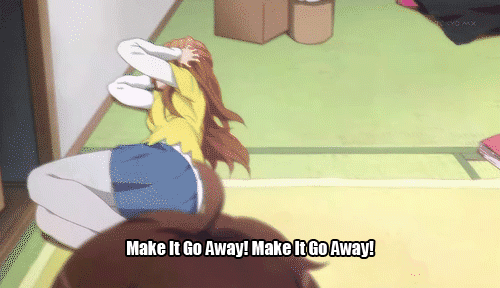
Rikka, our title chunibyo, in particular uses her fantasy in part to cope with grief, coming from an extended family that (without getting spoilery) didn’t help a young girl to deal with a very hard and life-changing time. Now that she’s in high school, her older sister blackmails Yuta (using an a voice recording of one of his chunibyo speeches) into helping deal with Rikka and things (like the cat she wants to adopt) that pop up.

One thing the show is very good at, though, is not making a single thing the reason behind a character’s chunibyo. One may have started their fantasy inspired by another person, or prompted by an event, but it’s also (while active) part of their personal narrative that influences how they spent their free time, how they see the world and keep blogs or diaries, etc.
But at the same time, they’re still teenagers, and their inner view of themselves...doesn’t always translate skills.
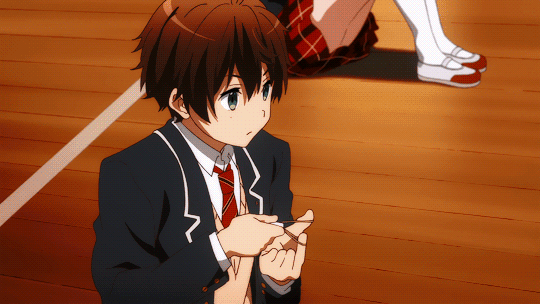
I said the show is primarily about friendship. A lot of that friendship is between Yuta and Rikka, but they accumulate a little group, mainly through Rikka’s attempt to start a magic club. Recruit 1: Kumin, a polite, quiet senpai with no chunibyo history or aspirations.
Kumin starts off seeming like a background character, but by the second season it’s clear she’s not just there for jokes about how she’ll take a nap anywhere. She’s perceptive, and genuinely enjoys watching the others act out their scenarios.
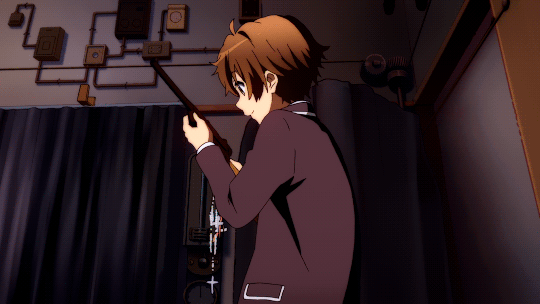
Compared to the other characters who are boisterous in their chunibyo activities (Rikka, Deko, Satone), or vociferously trying not to get drawn in to chunibyo activities (Yuta, Shinka), Kumin is happy to watch and offer encouragement, but she’s also willing to participate if a chunibyo scenario calls for a group.

Incidentally, the show does a really interesting thing where occasionally, we’ll be drawn “inside” the chunibyo world, seeing what Rikka/Deko/whoever see: a fantasy land, big magical weapons, anime-grade magical attacks. Occasionally we’ll also see what this “really” looks like--a couple people running around waving umbrellas at each other--but often we only get the fantasy version. It’s clear that Rikka and co. are legitimately on some level engaging in a shared imagination, and the times when a reluctant character (particularly Yuta or Shinka) willing steps in to the shared illusion are genuinely sweet.
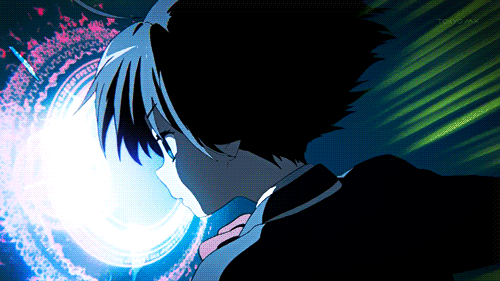
Speaking of, Shinka (aka Morisummer) became one of my favorite characters. Like Yuta, she was chunibyo (”Morisummer the magician”); like Yuta, she chose a high school where she didn’t know anyone expressly so she could reinvent herself as a normal teen. And like Yuta, she’s getting dragged kicking and screaming into chunibyo again.
It would’ve been so easy to make her a bad character. She’s pretty, puts a lot of effort into being popular and likable at school, trying to keep up a good teen girl image, despite being fairly sarcastic at her core. And as loathe as she is to admit it, she likes her friends (even if she won’t admit they’re friends, even if half of them are actively chunibyo, even if she says she’s only hanging around so she can make sure all traces of chunibyo-Morisummer are erased from the internet).
Shinka gets drawn in to the group through Rikka’s apparently only pre-existing friend: Deko, a fellow chunibyo who follows Rikka (or “Eye of the Wicked Lord Shingan”) as her master, and is extremely devoted to the great magician Morisummer. So devoted, in fact, that she has several physical copies of Morisummer’s book containing all her wisdom...aka Shinka-Morisummer’s blog, which Shinka has tried to erase all trace of.

Needless to say, the two don’t seem to get along great.
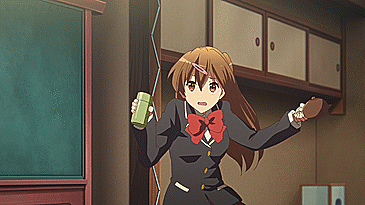
Deko’s dedication to chunibyo and Morisummer irks Shinka; Shinka’s claim to be Morisummer irks Deko, who refuses to believe the great magician could ever be this sarcastic, mundane girl. Deko’s refusal irks Shinka, bringing out the sarcasm and bluntness Shinka tries to hide from the school at large.
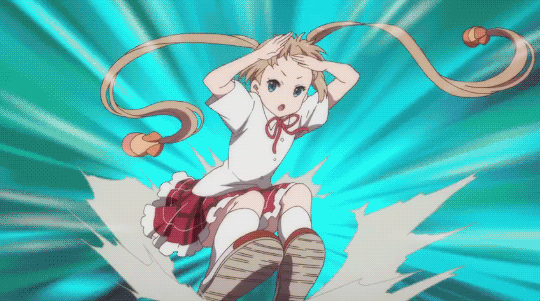
Obviously, they actually become close friends, but heaven help you if you actually say so.
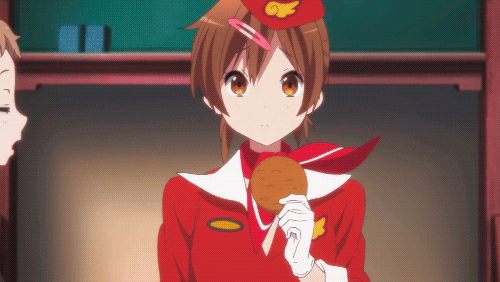
The entire series is an exploration of relationships, and Yuta’s developing closeness with Rikka (hey, we knew it was going to happen) is also sweet. He’s a genuinely likable boy, embarrassed by the vestiges of his former self he sees in Rikka, but often willing to meet her on her level, and both of them also learn/reaffirm the importance of doing things their way, and keeping both of them comfortable, rather than acting a certain way or performing specific acts just because their classmates think their relationship status mandates it.
Speaking of classmates--and I know this is getting long but I CAN’T HELP IT, I LIKED SO MANY ASPECTS OF THIS SERIES--the characters aren’t ridiculed at school. Sure, some people think they’re weird, but there’s no shunning, no arc involving teasing or bullies. Rikka’s often content as a loner, but when she attempts to join in a social circle, she’s welcomed. Shinka’s obsessed with reinventing herself and appearing normal and seems to think that otherwise she’ll be cast out, but multiple characters mention that others at the school notice how she behaves (oddly, on occasion) and there are no social repercussions. Truly nice for a show that has characters spending quite a lot of time in school.

Verdict
English dub? Yes, and it’s got strong performances. Rikka’s voice actor in particular does a fantastic job capturing the difference between chunibyo!Rikka’s confidence and command, and regular!Rikka’s, well, normal awkward teenageness. (Plus, I also found her lower-than animegirl-average voice enjoyable.) (Double plus, I honestly think her English voice is better than her original Japanese voice at showing the difference between her emotions and chunibyo/reality.) Deko’s VA is fantastic showing the enthusiasm of the 9th grader (and what enthusiasm, Deko is like the Energizer Bunny), and Shinka’s VA manages to show her alternating annoyance, cheerfully sweet ideal self, and organizized leader voices.
Visuals: Fine, and I really liked the chunibyo designs for each character’s chunibyo phase. The contrast between chunibyo-vision (giant magic weapons; mysterious lights, fantasy landscapes) and reality (an umbrella or soup ladle; a strip of lights taped to the floor; a local park) was really well done.
Worth watching? Yessss. It’s very manageable--two 12-episode seasons--and while each season contains its own arc (you could stop after the first one, but why), together they make an excellent story. Heck, I think the second season is equal to, if not better than, the first, because the friend group is well-established and even more fun to watch.
Where to watch (USA, as of October 2020): Netflix (dub, sub); Crunchyroll (sub), HIDIVE (sub & dub, plus OVAs and film)
Click my “reviews” tag below or search “mini review” on my blog to find more!
#love chunibyo & other delusions#chuunibyou demo koi ga shitai#Rikka Takanashi#Shinka Nibutani#Sanae Dekomori#anime#brb just going into withdrawal from the lack of Shinka and Deko snarking in my life now#not sure if Rikka was supposed to read as non-neurotypical but I think it's a possible interpretation & I want more#reviews#recommendation
84 notes
·
View notes
Text
The Characters of Nisiosin (1)

Trickster - Kumagawa
Nisioisin is a prolific writer famous for the many distinct characters he creates, and writes with a unique sort of empathy that lets them be their weird and crazy selves without judgement. Okay, with plenty of judgment. This is the start of a new series I’ve been working on which analyzes some of the common themes that appears in Nisioisin’s works with more depth, as Nisioisin is the type who reuses, and recontextualizes old ideas a lot.
The first thing we’re going to be taking a look at is Nisioisin’s take on the Trickster type character with Kumagawa. I’ll be doing Deishuu Kaiki, and Ii (Boku) to follow up.
A. Defining the Trickster.
Before we determine what a Trickster is we have to define what an Archetype is when it comes to character writing.
In theory, Jungian archetypes refer to unclear underlying forms or the archetypes-as-such from which emerge images and motifs such as the mother, the child, the trickster, and the flood among others. History, culture and personal context shape these manifest representations thereby giving them their specific content. These images and motifs are more precisely called archetypal images.
In other words they are ideas and images that reoccur in stories all around the world. For example a character like Loki has several things in common with the christian idea of satan even though they come from two different mythologies, both subvert the ‘father-figure’ king of their respective heavens, and both are responsible for kickstarting the chain of events that lead to the apocalypse scenario in both religions.
Archetypes are characters that follow certain pre-determined patterns we all recognize. Luke Skywalker is what most people would recognize as the hero of the story, Obi-Wan Kenobi is the mentor, just by thinking of ‘hero’ and ‘mentor’ you already have a pre-conceived idea of how the character is going to act in the story. This is a good guideline for analyzing the similiarities between the characters Nisioisin uses in his works.
The Trickster, Jung says, is an aspect of the shadow archetype, at least in its negative traits (see "On the Psychology of the Trickster-Figure". Examples of the trickster are Satan, Loki, etc.)
The shadow is an archetype that consists of the sex and life instincts. The shadow exists as part of the unconscious mind and is composed of repressed ideas, weaknesses, desires, instincts, and shortcomings.
If the Hero is what everyone thinks a good guy is, then the Shadow is playfully the opposite of they. They are what everyone thinks a good guy isn’t. They represent the repressed aspect of our minds, and exist to call into question the common order.
The trickster, obviously, deceives, often playfully, sometimes painfully. The Fool is a shadow figure distressed by some unconscious lack of power, often driven by greed or an inordinate desire for fame (all archetypes), who projects his or her inadequacies against scapegoats as described above. The Fool is not always negative, of course. A relatively benevolent form of the fool is the Clown, who is more aware of his or her trickster aspect, perhaps, than is the fool. [Source.]
The trickster is what the hero is not. They are the shadow the hero casts. While the hero’s domain is the light, the trickster often works in the dark, behind the scenes sneaking around in the shadows. The hero is often straightforward, the shadow deceives and obfuscates. The hero is conventional and the trickster unconventional.
In mythology, and in the study of folklore and religion, a trickster is a character in a story (god, goddess, spirit, human, or anthropomorphisation), which exhibits a great degree of intellect or secret knowledge, and uses it to play tricks or otherwise disobey normal rules and conventional behaviour. he trickster crosses and often breaks both physical and societal rules. Tricksters "...violate principles of social and natural order, playfully disrupting normal life and then re-establishing it on a new basis."
[SOURCE.]
To simplify there are four rules I am going to set as reoccuring in Nisioisin’s use of the Trickster Archetype:
Introduced as a Villain
Subverts Expectations
Lying, Liar who Lies
Inherent themes of Nihilism
1. Introduced as a Villain
Appearances can be deceiving. It is the trickster’s goal to deceive your expectations, and in that they subvert the natural order. In most stories the hero is good and the villain is bad. Straightforward so far, yes? Nothing is straightforward when a trickster is involved. Kumagawa Misogi is someone who is introduced and built up as the ultimate enemy of Kurokami Medaka. A girl with a noble goal of trying to make everyone happy. Therefore anyone who opposes her would have to be ignoble, right?
Kurokami Medaka brings out the best in people, and Kumagawa Misogi brings out the worst. That is the simple, black and white comparison that we’re given between the two of them at the start of the manga.
Kumagawa is so inhuman when we first meet him that for the first 52 chapters of the manga, when other characters refer to him and as he’s built up as an antagonist his face is always obscured. He’s not even seen as human in the eyes of others.
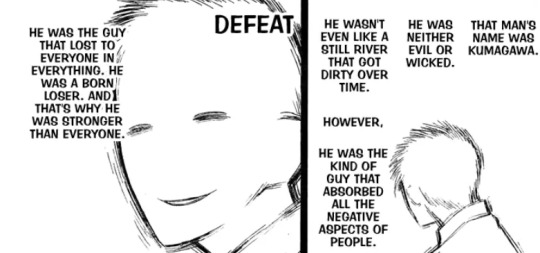
However, this simple idea is subverted by the manga itself. Medaka and Kumagawa are compared not as opposites but rather as complemtnary forces who not only have several things in common with one another, but also play into each other.

Kumagawa is someone who can uniquely understand Medaka’s point of view in a way other people cannot. He’s not someone who opposes Medaka, but rather someone set up to oppose her. Kumagawa is not only aware to some extent that Medaka is the hero of the story, but he’s chosen to make himself the villain.
2. Subverts Expectations
The entire point of Kumagawa’s arc is that even the absolute scariest types of people the minus, aren’t true villains of the story, even when they don’t want to be sympathized with, even when they don’t want to be saved, they are deep downs still people.

Kumagawa’s arc intentionally sets up the idea that some characters are natural villains who don’t want to be saved, only to subvert that idea in the end. Tricksters are subversive, they exist to flip standard notions of good and evil, black and white ideas on their head. They are transversive, once they have played their role in the story it is impossible to think of things the same way again.
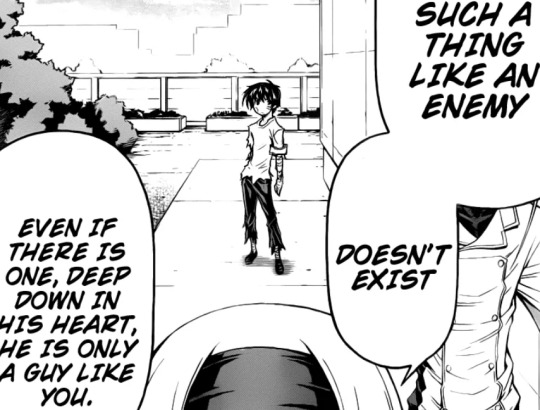
Kumagawa is a character who exists to subvert what we call traditionally binary opposites. That is ideas that we think oppose each other. Winners and losers, strength and weakness, talented and untalented, all of these ideas tie strongly into Kumagawa’s character.

Ajimu brings up Kumagawa’s bitterness towards the status quo. The people who are happy are the ones who are currently in power. They are the ones who are able to work hard, they are the ones who are able to have friends, they are the ones who always win in the end.
Kumagawa’s original goal is to flip those ideas on their head. To show that even people who are outside the power structure, outsiders like him, are able to have friends, to work hard, and to win.

By doing this he subverts the natural order and turns it around. This is what comes to a head in his fight with Medaka. Usually it would be the winner is the strongest, but the idea is flipped in that fight it’s proven the one who loses more and climbs their way back up is the strongest one.
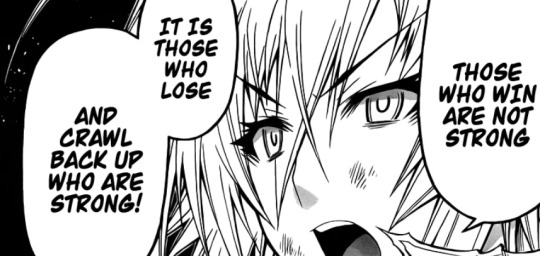
There is strength in weakness and weakness in strength and these ideas never play in the straightforward ways we think they will. That’s why Kumagawa who identifies as weaker than anyone else, is able to easily subvert the balance of power tip it in his favor and overcome strong people.
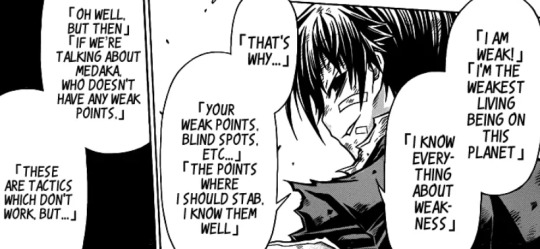
3. Lying, Liar who Lies
Basically Kumagawa lies as compulsively.. He says everything in [brackets like this] and it's like always speaking and using airquotes after everything you say. It makes everything he says sound completely insincere. It’s also a pun for ‘To Show Off’ meaning he exaggerates everything he says in order to look cool.
Kumagawa will just blantantly lie at times for no reason other than to lie. One of his habits is to claim things aren't his fault when they obviously are. His introduction is screwing everyone to a wall, and then standing there covered in their blood go [I'm not the one who did this, it's not my fault.] His introduction is him rattling off lies mainly to confuse people and make himself impossible to read.

The key word is once again these expectations. The trickster uses lies as a mean of controlling the expectations of others, playing around with them and he gains some measure of power over this. A trickster is often not very traditionally powerful and has to rely on his wits to get by.
Kumagawa's life is pure chaos and basically everything ever will go wrong for him, so he tells lies to have some kind of illusion of control over that chaos. People who see life as a story do so to give themselves agency, to trick themsleves into believing they’re the ones telling that story.

Kumagawa pretending that the world is a manga, gives him the illusion that he can read, and anticipate the world like he would a weekly shonen jump manga. When in reality the world is what it’s always been, complete chaos. Kumagawa tells himself that lie to obfuscate himself because he finds safety in those lies, in no one knowing who he truly is.
He finds his identity in those lies, which is why he intentionally plays the role of the villain when he could be a hero. Kumagawa will lie about his identity, first to be a bad victim, to be an ugly victim, he pretends these things have value because it's all he has. He only has negative experience of the world and the trauma he’s asquired so far and that’s what he finds familiarity in. Kumagawa finds identity in being the world's biggest loser.
4. Themes of Nihilism

Kumagawa is a character who directly confronts Medaka’s assertion that she was ‘born for a reason’, by asserting the opposite. That there’s no goal in life, no point to being alive, and therefore humans are born for no reason.
While that seems like a wholly negative statement at first, the point of Nihilism is to question established ideas and power structures. It’s to dismantle what we are told matters, and what we are told has meaning and instead come to understand our own meaning.
If Medaka is an existence desperately trying to give meaning to life, then Kumagawa is trying to reject the assertion that life has meaning. It’s understandable why. The values that are said to hold true for everybody else have never once held true for Kumagawa. If you work hard you’ll win. Bad people are the only ones that suffer. If you ask for help you’ll get saved. Kumagawa has witnessed all those things he is told should be true about the world proven as falsehoods, and because of that his response is one of rebellion against the order.
Nihilism is a step on the way to existentialism.
In the most basic terms possible it's like. Rejection of societal meanings and values that you are told about -> Rejecting everything which leads to moral nihilism (nothing has meaning boo hoo) -> Realization that if everything is just made up value you can make up your own, and that you're not freed from society's obligations and can pursue what you want (sunglasses nihilism, party time).
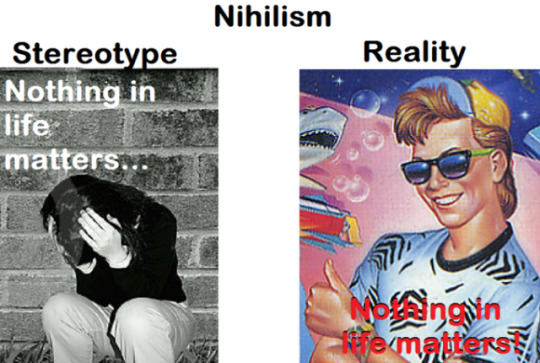
Kumagawa as a character is firmly in the middle step. He’s a character who rejects everything, because he finds his identity in his rebellion against traditionally held notions.
Kumagawa is a character trying to reject what everyone else tells him is meaningful, and instead trying to create his own meaning. He’s trying to find the positives in a life that’s literally nothing but suffering. That’s the point of his whole complex about minuses, that people who have everything go wrong for them still have a reason to smile.
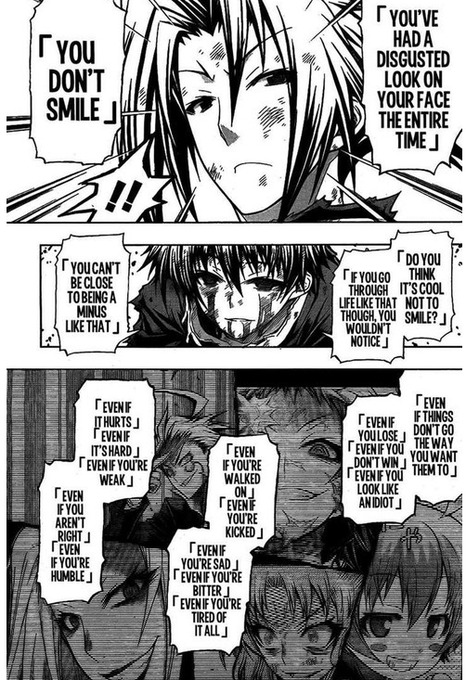
Basically Kumagawa's philosophy becomes, if I can endure all of this and still keep on laughing and smiling, then you can too. Even living the worst life possible where you can't accmplish a single thing, and can't amount to anything, you can still find something to laugh and smile about.
It’s a philosophy unique to him, and one that he could only come to by challenging the established norm. Not only does Kumagawa’s nihilism help the minuses, but he also ends up helping Medaka herself as she’s the one who has to let go of the ‘reason that she was born’.


Just like Kumagawa, Medaka has to go and seek out her own reason. As in the end the two of them as a pair, hero and villain, are not opposites but rather two sides of the same coin. They are complentary forces that contain parts of each other.
They are both ultimately, whether trickster or hero, very human characters. The roles in the story they play only serve to flesh out their humanity. Which is another theme in Nisioisin’s writing, but we’ll continue that in the next posts.
#kumagawa misogi#medaka box#medaka box meta#nisio meta#nisioisin#mb meta#kurokami medaka#trickster#jungian archetypes#jung
58 notes
·
View notes
Text
Ranking : The Coen Brothers (1954/1957 - present)
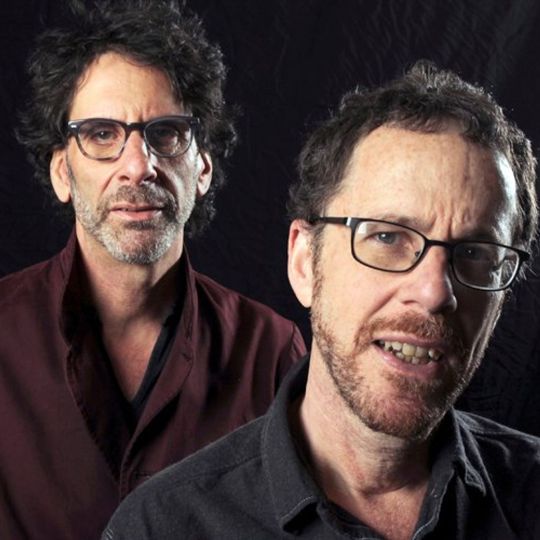
Directing a film can be one of the most vast, task oriented and stress inducing undertakings imaginable, which makes it odd that more directing duos, specifically sibling duos, do not exist. Sibling duos like the Wachowskis, Hughes, Farrellys, Safdies and even the Zellners have made names for themselves, but one set of siblings easily towers above the rest : the Coen brothers. With nearly 20 films under their belt, and nearly as many stylistic varieties and storytelling approaches found within, it is hard to argue the impression they have left on moviegoers worldwide over the past nearly four decades they’ve existed professionally. With such a stellar record of films under their collective belts, I’ve decided to do the most stress-inducing task of all : rank these films from least to most favorite.
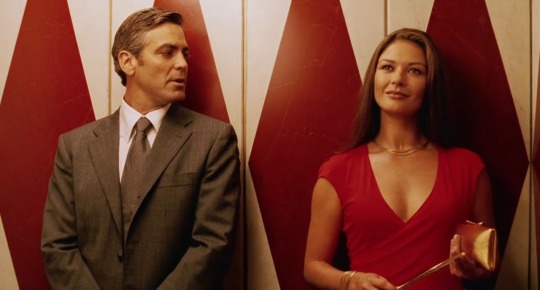
18. Intolerable Cruelty (2003)
For a duo with so much distinct style and flair for storytelling, this film feels the least like a Coen Brothers film. If anything, this feels like a script that sat on a shelf in pre-development hell, possibly for years, only for someone considering themselves a bit of a ‘maverick’ or ‘forward thinker’ to discover it and think that a dose of Coen Brothers magic could save it. Even with the star power of George Clooney and Catherine Zeta-Jones behind it, this one feels a bit too ‘by the numbers’ to stand out from an oeuvre that nears perfection.
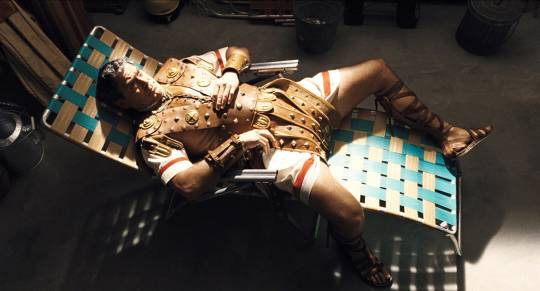
17. Hail, Caesar! (2016)
I’ll be completely honest with you all... I don’t remember much about this film. I remember enjoying it, but I don’t remember being blown away by it. I remember enjoying the colorful display of old Hollywood, and it’s always refreshing to see George Clooney lean into roles that border upon slapstick. For as much as I found this film not all that memorable, however, it stands above Intolerable Cruelty simply because it does not trigger bad memories.
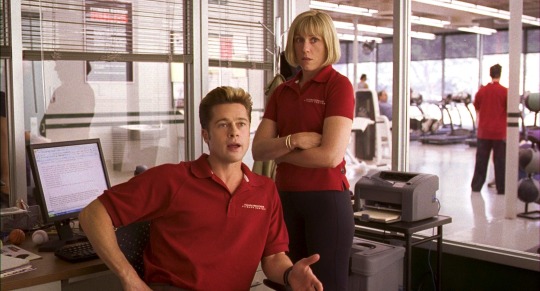
16. Burn After Reading (2008)
This film is what Intolerable Cruelty wanted to be... a property that is a hair closer to by the books, but full of a screwball approach that heralds to a forgotten era of film while using an incredibly stacked cast. Of all the Coen Brothers films I’ve seen, Burn After Reading feels like the property that all involved enjoyed making the most. Like many of the Coen Brothers films, the cast on this one is mega-stacked, and from top to bottom, everyone involved shines in roles that go against their standard types, or amplify the most off-beat aspects of their performing ability.
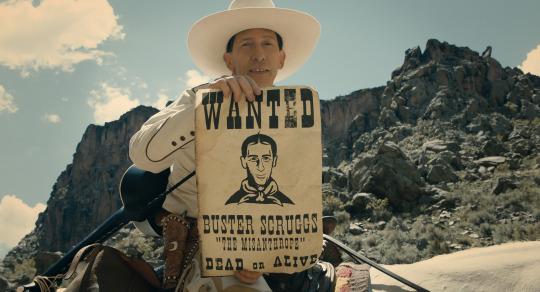
15. The Ballad of Buster Scruggs (2018)
The fact that Netflix was able to pull the Coen Brothers for a film is a win in itself, and with the duo choosing to do an anthology piece, Netflix was primed to maximize on their investment. While highly entertaining, however, the anthology nature of the property leaves it feeling a bit unfocused and disjointed at times... none of these stories really had enough meat on the bone to be expanded into feature-length films of their own, but for some reason, all parties involved passed on the opportunity to make a multi-episode serial rather than a film comprised of multiple tales. While using variance in storytelling methods and visual styles may work for some less talented directors, in the case of The Ballad of Buster Scruggs, it feels more like snack-sized bites in the place of true sustenance.
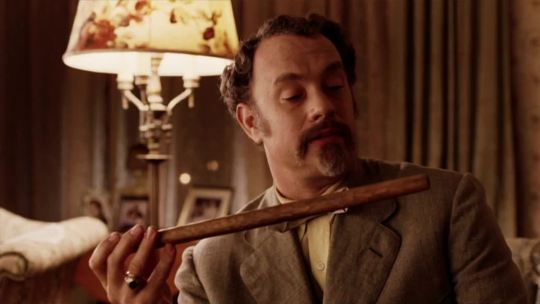
14. The Ladykillers (2004)
On paper, this film should have been a disaster. The Coen Brothers generally opt for original stories, so the fact that they chose to adapt such an obscure 1950s property for the modern day was strange, especially in light of the fact that most every element with the exception of Tom Hanks’ character was given a modern update. Somehow, despite all of this oddness, The Ladykillers managed to capture a sense of the classic Coen Brothers slapstick comedy that they famously established themselves with early on in their career. Tom Hanks is given the green light to go completely ridiculous, and to much of the viewers’ delight, he does so with great aplomb. His supporting cast shines, the comedic turn brings new energy to the story, and the southern gospel setting brings a rich sense of spirituality to an otherwise run of the mill film.
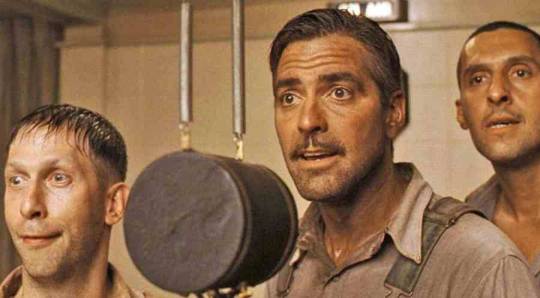
13. O Brother, Where Art Thou? (2000)
The Coen Brothers were essentially household names by the turn of the 20th century, but O Brother, Where Art Thou? propelled them into a legendary status. The grassroots mix of The Odyssey and the Robert Johnson crossroads legend took on a life of its own, leaving behind a soundtrack that birthed an entire generation of folk and bluegrass enthusiasts, as well as a film that showed the world George Clooney’s comedic chops. Much like The Ladykillers, O Brother puts viewers deep into the unfamiliar territory of Southern ‘discomfort’, with the African-American experience playing a major role in the narrative. Of all the Coen Brothers films one could use to introduce a stranger to their catalog, this one may be the best, as its infectious nature and stunning look leaves an impression on most anyone who has the pleasure to view it.
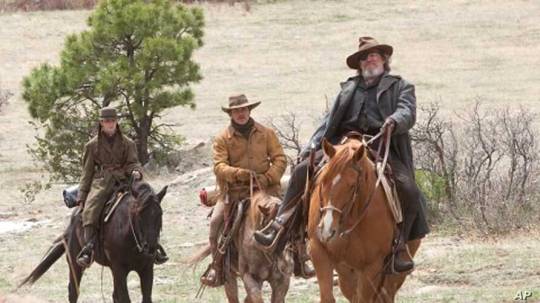
12. True Grit (2010)
The Coen Brothers had already covered a wide bit of genre ground within their first three decades, but surprisingly, they’d not done a true western up to that point (though many argue that No Country For Old Men is a modern take on the western). Therefore, when it was announced that their first western would be a remake of the iconic John Wayne film True Grit, many were surprised, and curious if they could pull it off. Not only did they pull it off, but in my humble opinion, they made a version that more than holds its own against the original. For the handful of big name and seasoned actors that signed on, it was the breakthrough performance of relative newcomer Hailee Steinfeld that outshined all. While The Ballad of Buster Scruggs was a fun revisit to the world of the western, True Grit was the kind of achievement that makes me want more traditional westerns from the duo.
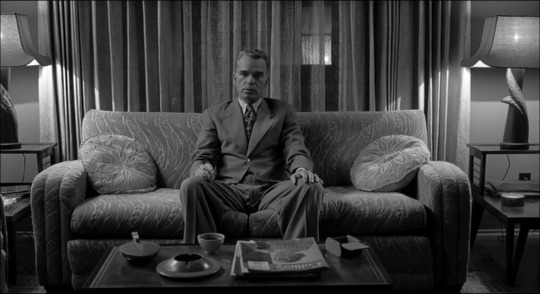
11. The Man Who Wasn’t There (2001)
Listing the Coen Brothers films is by far the most difficult ranking I’ve done to date, and the first film that really gave me trouble in terms of placement was The Man Who Wasn’t There. Personally, I find this film to be captivating and nearly flawless... Billy Bob Thornton’s detachment is rich and intrusive, which makes it all the more sinister when he does choose to exude even a hint of passion about something, be it positive or negative. The black and white photography, in league with the tone of the film, puts me in the mindset of films like In Cold Blood, and some of the sequences in the film stand out as some of the most iconic in the world of Coen Brothers films, especially the car crash. For a classic-style film noir, a genre that anyone with half a brain knew was a slam dunk for the Coens, the duo went above and beyond to both modernize and wholly embody the style. One of several Coen Brothers films that sits with you long after the final credits have faded away.
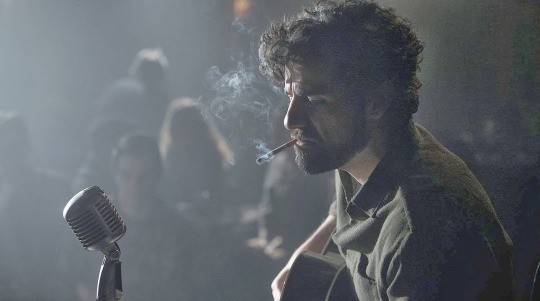
10. Inside Llewyn Davis (2013)
If this isn’t the darkest comedy in the Coen collection, it’s certainly giving the number one contender a run for its money. The intimacy of this film is unmatched within the broader collection of Coen characters, excluding The Dude, but the difference between Llewyn and The Dude is the personality equivalent of the difference between oil and water. You may marvel at Llewyn’s talent, but all the while, the film is screaming at you that “THIS IS A CHARACTER YOU SHOULD NOT ROOT FOR”. The symbolism found in the film is minimal while being incredibly effective in how it punctuates Llewyn’s personality and character, and the story structure is an equally subtle swerve that baits you into paying deeper attention, only to realize that the setup was the punchline the entire time.
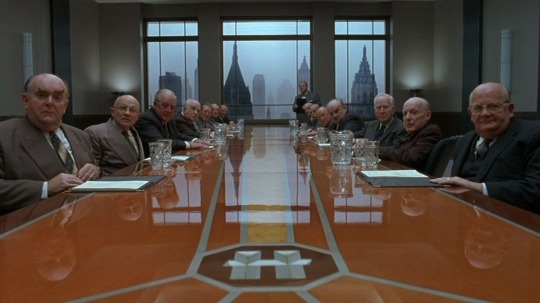
9. The Hudsucker Proxy (1994)
I’m a sucker for a Coen Brothers comedy, especially the ones that play like human cartoons, and one of their absolute best was The Hudsucker Proxy. The writing on this film is so tight that it would absolutely pop if it were any tighter. The entire A Christmas Carol-esque approach to the story makes it a wonderful moralistic tale that makes people laugh so much that they often don’t realize they are being taught a lesson about morals, integrity and self-respect. Tons of familiar character actors fill the frames, everyone tasked with supporting roles fit firmly and comfortably into the created world, and the man trio of Tim Robbins, Jennifer Jason Leigh and Paul Newman are functioning on genius levels of performance... especially Jennifer Jason Leigh. While not quite a holiday movie, there is enough of a holiday sense that it could be shoehorned into a seasonal viewing, but any time set aside for this gem is the right time to watch it.
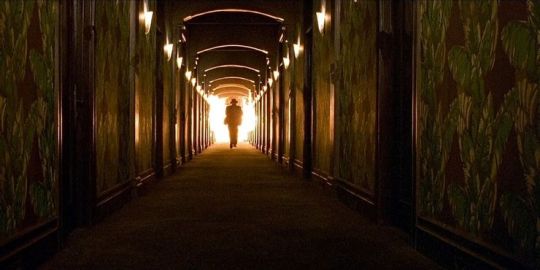
8. Barton Fink (1991)
In my humble opinion, this may be the strongest end to end performance from John Turturro in his long and storied career. As clear-cut fans of film, it is always a pleasure to see the Coen Brothers explore the world of film, and by using this approach, they are able to tell a bold, brash and haunting tale about the issues that come with assumptions about character and talent. The takes on Hollywood and the indifference of those in power, especially when it comes to assisting young and promising talents that may one day usurp them, and powerful. The real bow on the story, however, is the larger than life presence of John Goodman, who goes from being a slightly aggressive and overbearing sense of support to a literal madman by both name and action. For a film that mainly consists of individuals talking to one another about passion, talent and secrets, there is a kinetic energy that feeds the forward momentum of this movie, and for that, it stands out in the Coen collection.
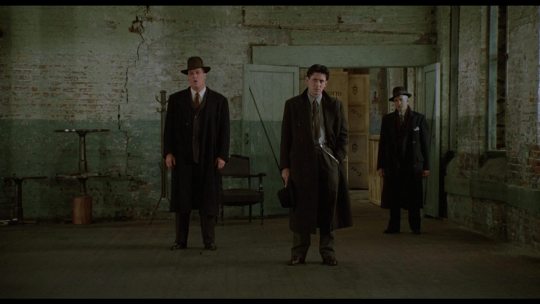
7. Miller’s Crossing (1990)
It’s not surprising that the Coen Brothers could make a compelling and memorable gangster film, but I don’t think that anyone expected a film as vicious and dark as Miller’s Crossing. For a duo that generally relies on nuance and contemplation to get their points across, this film certainly proves that they are more than capable of excelling in the direct approach as well. The era-specific costuming is outstanding, the murky city areas stand in stark contrast to the woods of the titular Miller’s Crossing, and the sheer volume of bullets are a stark reminder of the Prohibition-era story we are viewing. Gabriel Byrne shines in his lead role, bringing a world of fury, deceit and mistrust in tow with him. The iconic hat blowing in the wind serves as not only the biggest memorable moment from the film, but possibly also the single moment of peace and beauty found in a film that holds up a dirty mirror to a dark world.
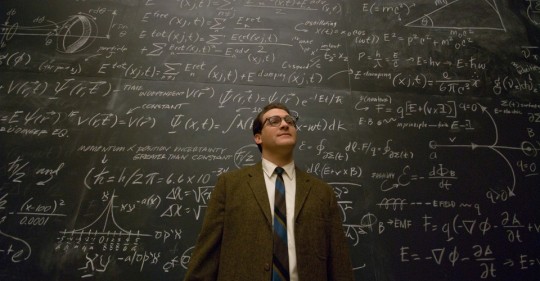
6. A Serious Man (2009)
Of all Coen Brothers films, this is easily the most underappreciated and slept on of the bunch. I’m a sucker for movies that embrace Murphy’s Law, and when mixed with the parable nature of the Book of Job, we are presented with a darkly comic and relatively unique version of the hero’s journey. The way that the personal, professional and philosophical problems pile up on Michael Stuhlbarg’s Larry are meant to be felt by the audience, and the way that his bad luck boomerangs out into the world during the film’s resolution must be seen in order to be believed. The way that destiny and chance dance around one another in this film is narratively breathtaking, and for such a subtle film, it is a truly remarkable achievement.
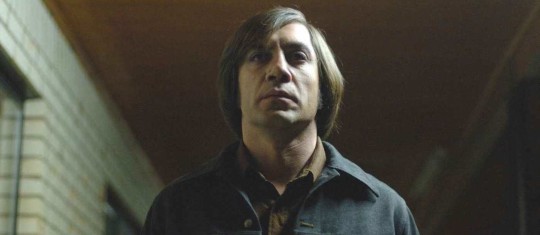
5. No Country For Old Men (2007)
When you think of the Coen Brothers, you don’t necessarily think of evil incarnate, and yet, the duo succeeded in capturing a character in the form of Anton Chigurh, the closest thing to the Terminator that the duo has ever created (to my knowledge). The story is a wonderful, subtle tale of how the times can change into something we don’t recognize before we recognize the change, but it is easily Javier Bardem’s iconic performance that gives this film all of its power and ominous energy. His unyielding forward momentum, his disdain for obstacles in any form, and his disregard for human life are enough to instill real fear into those who partake in viewings, and his presence will more than likely haunt you far beyond completion of the film. A true modern-day masterpiece that would have been higher, if not for...

4. Blood Simple (1984)
What a powerful debut, and one that not only hinted at, but outright put the spotlight on the promise of the Coen Brothers when it came to stark visuals and stunning storytelling. For such a simple, small scale story, the tangled web that is woven is a slippery slope of deception and distrust that leaves little to no survivors in its wake. The scale of the film is deceptively small, but the quality shines in every aspect that it can. Seeds are placed that pay off wonderfully, and the color palette presented gives the film the feeling of a Technicolor film-noir. Much like A Serious Man, Blood Simple deserves to be talked about and held up much more than it is by fans of film.
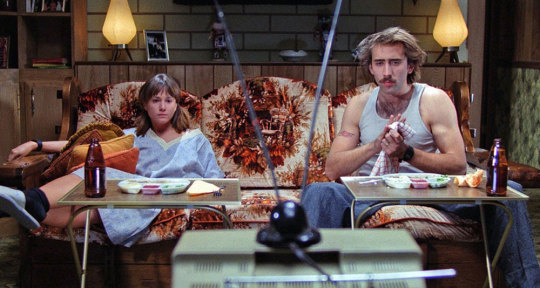
3. Raising Arizona (1987)
What a wonderfully ridiculous movie about something as simple as the trials and tribulations of navigating love, marriage and parenthood. The most hilarious aspect of this film, in my opinion, is how it feels like a living and breathing cartoon, both in terms of the character performances and the outrageous events that take place within the world of the film. Nicolas Cage is operating on a completely different level, Holly Hunter is equal parts charming and hilarious, Trey Wilson is wonderfully over the top, John Goodman and William Forsythe bring excess hilarity to the wild proceedings, and Randall “Tex” Cobb is downright iconic in terms of his ridiculous character. The pacing of the film is breakneck and feverish, the comedy hits never stop coming, and the utter charm emanating from the midst of the caper presented is infectious. As a second film, this could not be any more different than Blood Simple, and yet somehow, it connected so vividly with viewers that it remains a must-watch film to this day.
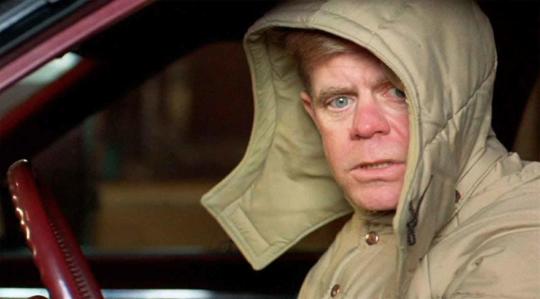
2. Fargo (1996)
What is there to be said about Fargo that has not already been said? For a duo with more iconic films to their name than some directors have completed films, Fargo was an immediate signal that the limits of the Coen Brothers’ creativity and skill had not even began to show its full breadth. Within less than five years of release, the film was already heralded as a classic (of all-time, not just modern day), the mystery surrounding its possibility of being based on a true story built a world of intrigue around the movie, and it has gone on to create a universe of its own in the form of an FX TV show that recently wrapped its fourth season. There is not a wasted role in this film, and to this day, any movie fan worth their salt will happily bust out their version of a Minnesota accent that is almost certainly based on one of the many memorable characters that inhabit the world of Fargo. Numerous actors, including William H. Macy, Frances McDormand and Steve Buscemi, all found breakout success in the wake of this wonderful film.
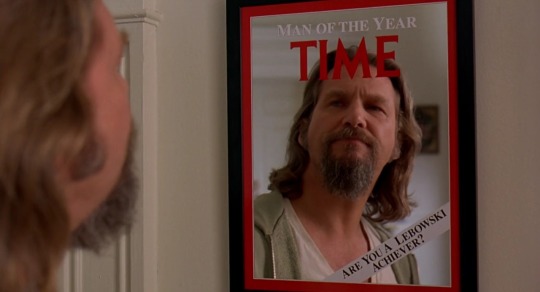
1. The Big Lebowski (1998)
Was there ever any doubt for this placement? For everything that Fargo did in terms of success within the world of the film industry, The Big Lebowski did that and more for the worlds of the counter-culture and cult film fans. The story we are presented with is so simple, yet so ridiculous in its journey, that it almost insists on viewers revisiting it over and over. Like many Coen Brothers films, nobody cast in the film is wasted or misused, and due to these stellar performances, the film finds itself as one of the most quotable in recent memory. Much like the performances of the cast, the writing does not waste any words or opportunities, often referring back to itself in extremely subtle and nuanced ways that present themselves over time, and to hilarious effect. Nobody would have expected a film of this nature to have a fandom, and yet, the legions of fans for this film are unique to that of the Coen Brothers catalog in the sense of their dedication, devotion to and love of the movie. While not everyone’s cup of tea upon first viewing, The Big Lebowski is truly an example of the gift that keeps on giving.
If the Coen Brothers never make another film, they’ve already created and achieved more in their journey that most filmmakers can dream of. Many of their films could honestly be considered works of art, and nearly all of them are compelling with an ability to leave deep and lasting impressions. If you are unfamiliar with the Coen Brothers, do yourself a favor and check out their work, as it may bring a new sense of invigoration to your love of film.
Editor’s Note (12/10/2020) : Inside Llewyn Davis added to the number 10 position, all films ranked lower adjusted accordingly.
#ChiefDoomsday#DOOMonFILM#JoelCoen#EthanCoen#CoenBrothers#BloodSimple#RaisingArizona#MillersCrossing#BartonFink#TheHudsuckerProxy#Fargo#TheBigLebowski#OBrotherWhereArtThou#TheManWhoWasntThere#IntolerableCruelty#TheLadykillers#NoCountryForOldMen#BurnAfterReading#ASeriousMan#TrueGrit#InsideLlewynDavis#HailCaesar#TheBalladOfBusterScruggs
4 notes
·
View notes
Text
WYRD SISTERS (1988) [DISC. #6; WITCHES #2]
“‘No one would come up here this time of night.’ Magrat peered around timidly. Here and there on the moor were huge standing stones, their origins lost in time, which were said to lead mobile and private lives of their own. She shivered. ‘What’s to be afraid of?’ she managed. ‘Us,’ said Granny Weatherwax, smugly.”
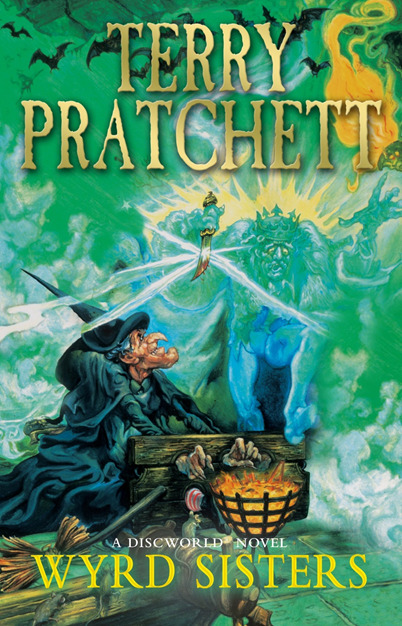
Rating: 6/10
Standalone Okay: Yes
Read First: Yeah!
Discworld Books Masterpost: [x]
* * * * * * * * * *
I’m just going to jump right in with this one: the best part about the Witches sub-series of the Discworld is that they are all, in their own way, stories about stories. They’re stories that follow other stories, the tropes and archetypes and established narrative structure, but they’re also stories that subvert that structure at just the right moment to make something that feels much more truthful, and often, much more real.
Stories about stories.
This is sometimes very literal: Wyrd Sisters, for example, has very obvious Shakespearean roots, notably from Hamlet and Macbeth, and seems to gleefully delight in throwing around references—three witches meeting to cast spells, blood on the murderer’s hands that won’t wash away, the ghost of a murdered father begging his son to seek revenge, a theater called The Dysk that mimics Shakespeare’s Globe, etc., etc., etc.—that then get turned over on their heads. We’ll see it done again with the fairy tale elements of Witches Abroad, and the Phantom of the Opera parody that is Maskerade. These books are, in a very real sense, skipping the setup and instead using cultural touchstones as framework. The books starring the witches are literally new stories being told about stories we, the audience, already know and recognize.
But sometimes it isn’t literal at all: witches, after all, work magic most often through psychology and metaphor. “Headology,” as the witches call it, is the basis of witchcraft, and it’s all about the stories being told. It’s in the things the witches do for respect, like their hats and black outfits and their out-of-the-way cottages they pass down from one witch to the next, or the way they bow instead of curtsey. It’s in the things they call magic even when it isn’t, like using real herbs and medicines to cure illnesses, or waving their hands over a pot of tea and chanting nonsense before ‘reading the future’ in the leaves, all of it only for the look of the thing from the outside.
And it’s also in the things they tell themselves. For example, when Magrat’s broomstick stops working in Wyrd Sisters, she does what she calls a Change spell—which simply means that the rest of the world remains the same, but she changes the way she sees herself. Before, she was a young woman on a broom rapidly falling out of the sky, and now she’s a confident young witch who can deal with any disaster that comes her way, so she’s therefore a lot less worried about it.
And it works. That’s the thing: Magrat is just fine. Witches do magic in and on themselves, it’s all nothing more than a thought, and yet it works.
None of the Witches books are particularly subtle about the point they’re trying to make with the whole deal, either. In Wyrd Sisters, it seems like everyone is talking about the power of words and stories, the way that the things we tell ourselves and each other can shape the reality of the world we inhabit. There are some negatives you can pull out of that message—history is malleable and written by the victors, propaganda triumphs over the truth, etc., etc. But there are a lot of more interesting, thought-provoking ideas to consider, instead. For example: just because narrative structure has already delivered us the broad strokes of the plot (anyone who’s studied any Shakespeare, which can reasonably be assumed to be any native English speaker older than about sixteen, can probably guess the general course of Wyrd Sisters by about page twenty), it doesn’t mean there can’t be originality and meaning in the specifics.
And that originality and meaning is what makes all the Discworld books work so well. Pratchett is parodying, sure, but he’s also creating something very new and earnest and sincere, and that just doesn’t work if the story is an exact beat-for-beat retelling of an already-told tale.
Wyrd Sisters agrees with that idea. Destiny is all well and good—it’s nice to think that what’s to come is pre-planned, easy to predict, and impossible to subvert—but the world just doesn’t work like that. The story isn’t plotted out in advance.
As Pratchett says later in the book: “Destiny was funny stuff…You couldn’t trust it. Often you couldn’t even see it. Just when you knew you had it cornered, it turned out to be something else—coincidence, maybe, or providence. You barred the door against it, and it was standing behind you. Then just when you thought you had it nailed down it walked away with the hammer.”
The witches certainly don’t truck with destiny. Or, well, it may be a tool in their storytelling arsenal, but they don’t see it as a concrete thing. Destiny is what you make of it, and Granny and Nanny are movers and shakers. That makes it especially ironic that the book is called Wyrd Sisters—the word “wyrd” is an old Anglo-Saxon concept referring to fate or personal destiny, so the “wyrd sisters” themselves typically would be the three Fates, a la Greek mythology, rather than three women who tend to grab Fate and Destiny by the ears and twist until they decide to agree that the witches have the right of it.
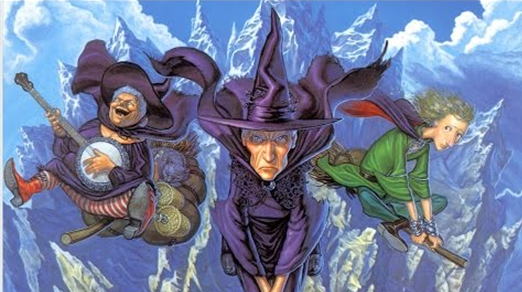
Honestly, though, if Granny Weatherwax looked at me like that, I’d do whatever she wanted, too.
I just want to bring up something I really like about Pratchett’s writing style: despite the fantastical setting, despite how far from reality he can get, he’s not afraid to switch to Roundworld concepts or just flat-out break the fourth wall in exchange for better, more impactful descriptions. I like to call this cinematic writing, and sometimes that’s actually very literal. There are quite a few passages in various Discworld books where he starts to write in an almost movie-script style. After Moving Pictures, which is still a good four books away at this point, I think that becomes less notable. Here, and in the previous few Discworld books (Mort, Sourcery, Equal Rites), when Discworld does not have any parallel equivalent to Roundworld’s Hollywood, it’s pretty damn unusual for an author to just outright throw aside their own fantasy setting to make a description in real-world terms.
My favorite example of this from Wyrd Sisters:
“It is almost impossible to convey the sudden passage of fifteen years and two months in words. It’s a lot easier in pictures, when you just use a calendar with lots of pages blowing off, or a clock with hands moving faster and faster until they blur, or trees bursting into blossom and fruiting in a matter of seconds… Well, you know. Or the sun becomes a fiery streak across the sky, and days and nights flicker past jerkily like a bad zoetrope, and the fashions visible in the clothes shop across the road whip on and off faster than a lunchtime stripper with five pubs to do. There are any amount of ways, but they won’t be required because, in fact, none of this happened.”
You can practically imagine the way that scene would look in a blockbuster movie, and it’s wonderful that Pratchett describes it crystal clear just to let us know that it is not, in fact, how it looked at all.
There’s a lot more to like about Wyrd Sisters, too, for all that it isn’t one of my favorite Discworld books. It’s a far better introduction to the witches—specifically Granny Weatherwax—than Equal Rites is, even though Equal Rites is technically the first book in the Witches sub-series. It introduces some characters we’ll see a lot more of later, like King Verence and the greater Ogg family, but also characters that will go on to become staples of the Discworld, like Nanny Ogg and Magrat. We also have some lovely cameos from already established characters: notably Death and his interactions during the play at the castle, but there are some good Ankh-Morpork moments, like the Librarian’s appearance at a barfight.
And we get to see the good old Discworld humor really click—it’s all about that balance between absurdism and realism, or between established tropes and self-awareness. One of my favorite examples of this comes right at the beginning of the book:
“As the cauldron bubbled an eldritch voice shrieked: ‘When shall we three meet again?’ There was a pause. Finally another voice said, in far more ordinary tones: ‘Well, I can do next Tuesday.’”
Pratchett’s really got a sense for it by this point, and he can deliver zinger after unexpectedly delightful zinger. Discworld books are always beautifully funny, of course, even though after a while you really get a feel for when a good joke is coming. Some people might think that knowing the punchline is coming might make it less funny: it absolutely does not. All it does is make the unexpected, sneaky moments—when the humor Pratchett has been secretly setting up for ages finally creeps up to smack you in the face—hit harder. Maybe others disagree, but I can read Discworld novels again and again, and they always get me just as much as they did the first time through. In my opinion, that’s real comedic talent.
Up next in the series we have Pyramids, our first unconnected one-off story, which is wonderfully weird even for a Discworld book! Stay tuned!
* * * * * * * * * *
Side Notes:
Every time that oh-so popular Ankh-Morporkian dive bar, the Drum, pops up, it’s fun to note where it’s at these days: Mended Drum, Broken Drum, etc. In Wyrd Sisters, Tomjon and Hwel go drinking in the Mended Drum.
There are several adaptations of Wyrd Sisters, including a 4-part BBC radio show, an animated film, and a stageplay.
As I go over my highlighted quotes and annotations from each book, putting these posts together, I learn more and more about myself. What I like, what I find funny, what I care to notice. For example, Vetinari shows up exactly ONCE in this book, and just in a footnote, and yet I still highlighted it and wrote a note next to it that contained mostly exclamation points. There’s no real point to this; I just want everyone to know how much I love Vetinari.
Favorite Quotes:
“As the cauldron bubbled an eldritch voice shrieked: ‘When shall we three meet again?’ There was a pause. Finally another voice said, in far more ordinary tones: ‘Well, I can do next Tuesday.’”
“Witches are not by nature gregarious, at least with other witches, and they certainly don’t have leaders. Granny Weatherwax was the most highly-regarded of the leaders they didn’t have.”
“Now, just when a body would have been useful, it had let him down. Or out.”
“‘No one would come up here this time of night.’ Magrat peered around timidly. Here and there on the moor were huge standing stones, their origins lost in time, which were said to lead mobile and private lives of their own. She shivered. ‘What’s to be afraid of?’ she managed. ‘Us,’ said Granny Weatherwax, smugly.”
“‘How many times have you thrown a magic ring into the deepest depths of the ocean and then, when you get home and have a nice bit of turbot for your tea, there it is?’ They considered this in silence. ‘Never,’ said Granny irritably. ‘And nor have you.’”
“His body was standing to attention. Despite all his efforts his stomach stood at ease.”
“Back down on the plains, when you kicked people they kicked back. Up here, when you kicked people they moved away and just waited patiently for your leg to fall off.”
“The Ogg grandchildren were encouraged to believe that monsters from the dawn of time dwelt in its depths, since Nanny believed that a bit of thrilling and pointless terror was an essential ingredient of the magic of childhood.”
“She gave the guards a nod as she went through. It didn’t occur to either of them to stop her because witches, like beekeepers and big gorillas, went where they liked. In any case, an elderly lady banging a bowl with a spoon was probably not the spearhead of an invasion force.”
“‘You’re wondering whether I really would cut your throat,’ panted Magrat. ‘I don’t know either. Think of the fun we could have together, finding out.’”
“Wizards assassinated each other in drafty corridors, witches just cut one another dead in the street. And they were all as self-centered as a spinning top. Even when they help other people, she thought, they’re secretly doing it for themselves. Honestly, they’re just like big children. Except for me, she thought smugly.”
“‘Man just went past with a cat on his head,’ one of them remarked, after a minute or two’s reflection. ‘See who it was?’ ‘The Fool, I think.’ There was a thoughtful pause. The second guard shifted his grip on his halberd. ‘It’s a rotten job,’ he said. ‘But I suppose someone’s got to do it.’”
“Granny’s implicit belief that everything should get out of her way extended to other witches, very tall trees and, on occasion, mountains.”
“Only in our dreams are we free. The rest of the time we need wages.”
“Words were indeed insubstantial. They were as soft as water, but they were also as powerful as water and now they were rushing over the audience, eroding the levees of veracity, and carrying away the past.”
“‘Witches just aren’t like that,’ said Magrat. ‘We live in harmony with the great cycles of Nature, and do no harm to anyone, and it’s wicked of them to say we don’t. We ought to fill their bones with hot lead.’”
“‘I shall haunt their corridors,’ he said, ‘and whisper under the doors on still nights.’ His voice grew fainter, almost lost in the ceaseless roar of the river. ‘I shall make basket chairs creak most alarmingly, just you wait and see.’ Death grinned at him. NOW YOU’RE TALKING.”
14 notes
·
View notes
Text
Chamomile Comic Trivia #10
#46 Proper
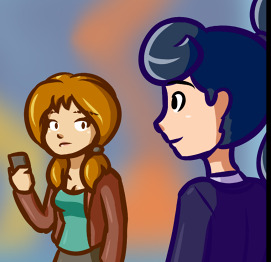
A bit of character-background building to be done here. This comic confirms that Brianna does actually own and run the café, thus I needed to address why Brianna, established to be Cammie’s best friend since they were kids, wouldn’t offer her a job at the café. The easy answer was that she didn’t have any job to offer, so I was able to make a joke by putting her on the spot about it by removing that excuse. Brianna loves Chamomile, but she’d rather keep things uncomplicated by not becoming her boss.
#47 Dishes

Just a silly little “relatable” one-off. I procrastinate on the washing up, but I admit, christmas mugs crosses a line for me. The above is one of my fave Cammie panels, I used it as an avatar on messaging services for several months after this comic lol.
#48 Ambience
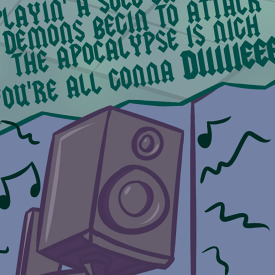
Typical early-character writing where I depend on the random factoids I spun off my brain for the character pre-comic - in this case the fact that Layla enjoys hardcore noisy music like metal, DnB etc. And... I can’t believe the fated day is finally here, it’s time to reveal the song lyrics that got hidden behind Cammie and Layla’s speech bubbles! (I recommend re-reading the original comic to remind yourself of Layla’s specific comments on the song for full enjoyment).
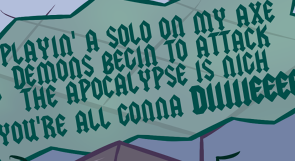

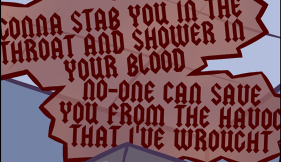
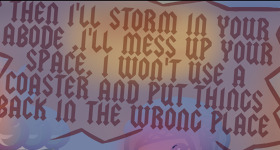
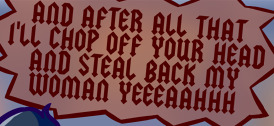

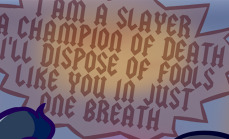
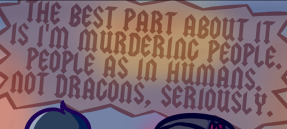
Of course if you check the original comic for the tiny scraps that you can see of the hidden lyrics, this really is what they were the entire time. I tend to have fun with hidden stuff coz I know it won’t go unappreciated forever since I love doing commentaries lol.
#49 Isn’t

Customer service jokes are about 25% venting and 75% hopeful that anyone who identifies as the customers who are reading my comics will change their ways.
A few months back I got an ask on curious cat about what the main cast’s favourite beverages are, I mentioned there how funnily enough, it was about to come up in the very next trivia post... so here it is! I’ll copy and paste from my response there, actually:
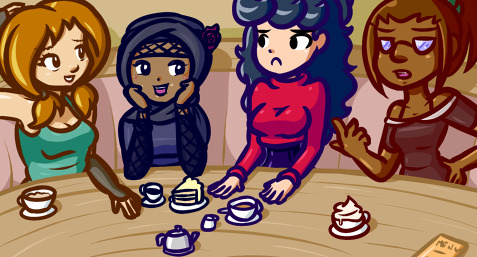
Cammie typically just drinks regular English Breakfast tea the most, not her namesake, Brianna varies but usually just gets Filter Coffee with milk, Layla almost always drinks espresso that she likes to contrast with a slice of whatever cake is going, and Vienna... ironically enough compared to Cammie, does in fact enjoy Café Viennas, which is a style of coffee prepared with whipped cream (and what she was named after!). I made this decision when I first drew them all having hot drinks together in #34 (and then here once Layla was introduced) and I've kept it pretty consistent in all the comics that depict them as such... apart from Brianna which is why I've decided she likes variety! Ahahahaha writing is great I can do anything!!!
#50 Confident
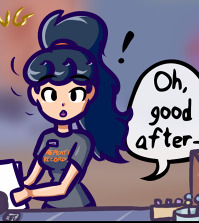
And the first major milestone is reached! I simply had to do a seagull comic for the 50th, and I felt it was the perfect timing to unexpectedly bring the seagull back with how down-to-earth the comic had been for the most part over the last few months before this. I won’t lie, in my head I imagined I’d come up with more “silly” plot points like the seagull but I kinda just never did lol. At the very least, the seagull plot does establish a tone that allows me to do silly jokes in general now and then where the characters don’t act like sensible human beings for the sake of humour.
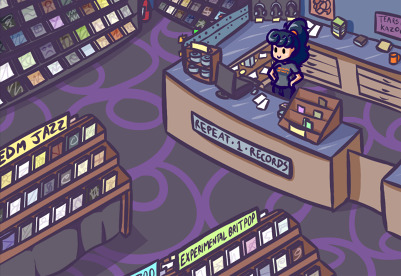
Whenever I have to draw shelving in Repeat 1 Records, I always dread the workload ahead of me, but honestly - and I didn’t even think about this when I made this decision - a music shop means most of the products on display are all just squares that I can sometimes even copy and paste when I need to. Funnily enough, it’s oddly hard to come up with like 50 random colours that feel natural for the various albums, so whenever I have to do a detailed shot like this, I’ll stick my iTunes library on shuffle and use the album art of the songs that come up as a base colour for each one. Sometimes I’ll then squiggle over the top with whatever (as I did for this comc) or sometimes I’ll draw literally a 10 second squiggle doodle of the real album artwork I grabbed the colour from.
Other than that, a quiet, personal running gag for me is coming up with comical music genres for the signage on the various sections of the shop, look out for more of those as the comics go on.
Finally, there’s a poster on the wall at the very back there for something called “Tears of Kazoo”... Encouraged by a friend who made (and I believe still makes) anything-goes experimental music, sometime during my first year of University, over a decade ago, I made a 20 minute album of me playing the kazoo just so I could say I’ve made an album. Some long, longtime followers/friends will still compliment me on it should it come up in conversation. It was definitely not good, but it was fun and I did it. I went back to check where I announced it on deviantART back in the day, and I’m pleased to confirm that the download link to it is dead.
[More Chamomile Comic Trivia]
9 notes
·
View notes
Text
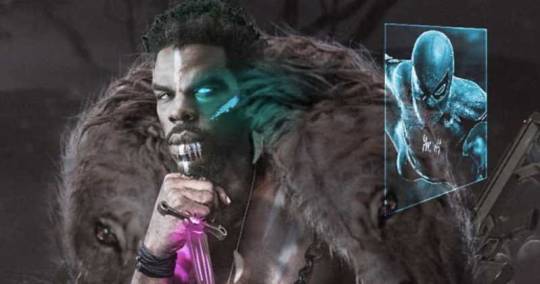
I want to talk about the rumour of Kraven being from Wakanda.
Now I hope in the past I’ve been very clear about my stance when it comes to casting actors of different races, ethnicities, etc from their comic book counterparts.
To repeat myself I think it’s fine so long as the character in question doesn’t demand to be of any particular race or ethnicity (for the sake of argument let’s discount being an American/New Yorker) and the actor is a good choice for the role. As a follow up I do fundamentally disagree with actively seeking out to racebend characters 99% of the time, it should simply be that every actor who would be a good fit, regardless of their race and so on, should be looked at and then the best person for the job hired.
This then brings us to Kraven and for what I am about to say let’s presume for a moment the rumours are true.
For Kraven casting a black actor in the role is rather dependent upon what direction they are going to adopt for the character.
In a sense there are two Kravens from the 616 universe. I’m going to refer to them as pre and post KLH Kraven. Pre-KLH Kraven, as the name would imply, is Kraven as he was typically portrayed prior to Kraven’s Last Hunt and post-KLH Kraven is how he was portrayed during and after that story, which would include not just stories where he was alive but also flashback stories, appearances as a ghost or vision and also his metaphorical ‘ghost’, e.g. how characters talked about him after he died.
Whilst neither version was portrayed exactly the same way in every story, more often than not they had a consistency to them.
Pre-KLH Kraven was really nothing more than a B or C list villain who’s gimmick was simply being a jungle themed big game hunter who was a take upon the classic ‘The Most Dangerous Game’ archetypical antagonist.
And he was a jobber. Really his shining moment was in ASM #47, a story remembered more for it’s supporting cast drama and Romita artwork than for it’s super villain plot, but the latter (and thus the super villain in question) became memorable via association. It was also a time when Kraven scored essentially an unmitigated victory against Spider-Man but got his comeuppance shortly thereafter. Really Kraven’s role might’ve been played by almost any villain and amounted to practically the same thing.
In truth he was something of a joke character no one took seriously as a threat and was a villain few people, if anyone, particularly liked.
Post-KLH Kraven though is a different story altogether. The unimpressive reputation of pre-KLH Kraven helped to fuel the success of this iteration as in Kraven’s Last Hunt a villain considered a joke suddenly became deadly dangerous and effective. It wasn’t just in terms of the physical threat he posed though or even his deranged plan. Kraven’s personality got a makeover. Instead of overwriting what we’d known of him before J.M. DeMatteis expanded upon what we knew about Kraven and constructed a truly complex and nuanced character, who’s motivations and actions were understandable even as they were clearly deranged and insane.
Across just six issues (arguably just one even) Kraven the Hunter’s reputation was totally hanged. He became a contender amongst Spider-Man’s most effective and formidable foes and to many a fan favourite. This reputation was further fuelled by the legacy of Kraven’s Last Hunt consequently leading to further mentions and appeareces of Kraven usually being reframed through the lens of his more complex and darker Kraven’s Last Hunt characterization. This was even the case with the Chameleon, a character strongly associated with Kraven who was used in a very ambitious revenge scheme upon Spider-Man motivated by Kraven’s death, and used his ‘ghost’ as a weapon against Spider-Man. In the story Chameleon received his own share of character development as his backstory was revealed as inherently linked with Kraven.
The key to DeMatteis’ decision to use Kraven, to understanding the character and to developing him (and by extension the Chameleon) was the fact that he was Russian. DeMatteis was a fan of Russian literature and connected with it a lot so it was through that lens he expanded Kraven’s character. Rather than being a big game hunter who happened to be of Russian descent*DeMatteis revealed Kraven was a Russian aristocrat who’s lose of his home, wealth and ultimately his family in the 1917 Russian Revolution was the key to his embracing of a more primal lifestyle in the animal kingdom and his obsession with Spider-Man.**
The Russian influence was so important that on occasion Kraven’s name would at times be stylized with Russian alphabet characters.

In other words post-KLH Kraven is the more popular and dramatically compelling rendition of the character and his Russian origins are integral to that.
You likely see my point in all this.
If the MCU adopts the pre-KLH rendition of Kraven casting a black actor won’t really be a problem as his ethnicity is mostly irrelevant to the character.
However if they MCU adopts the post-KLH Kraven then casting a black actor would be a problem as his Russian aristocratic heritage is inherently vital to who this rendition of Kraven is; and unless I am very much mistaken there were no black Russian aristocrats.***
The question then becomes which version should the MCU adopt.
And frankly the answer should be pretty obvious. Even if you wouldn’t commit to a Kraven’s Last Hunt story specifically the post-KLH rendition of Kraven informed by his Russian heritage has proven itself inherently more dramatically compelling and effective. Pre-KLH Kraven is really just a gimmick villain with little substance, making him a Wakandan might improve upon that to an extent but why bother when the comics already have a more compelling version of the character to drawn from. Making him a Wakandan also perpetuates a systemic issue with MCU Spider-Man, that his corner of the MCU is dictated more by the wider MCU than...well...Spider-Man himself.
If you examine most of the Phase 1 movies, or in fact most of the MCU origin films you will see that most everything in them is built around and flows from the central character. Captain America the First Avenger might use Asgardian technology as a plot device, but fundamentally the movie revolves around Steve Rogers and everything is first and foremost connected to him. Same thing with Thor 2011 and Iron Man 2008 and Doctor Strange 2016.
The Spider-Man films have been this weird exception to the rule as Spider-Man himself and his world has to a very large extent revolved around other characters or the wider MCU, typically Iron Man or Iron Man associated elements. Case in point both of his villains’ have been designed as dark reflections of Iron Man and their motivates stemming from him, their ultimate plan revolving around the acquiring of his technology. If MCU Kraven is a Wakandan and uses Wakandan technology, and presumably will be motivated due to factors connected to Wakanda, we might be not be usuing Iron Man elements but the underlying problem would remain the same.
It’s Spider-Man’s characters and Spider-Man’s world essentially filtered through the lens of the MCU rather than organically integrated within the MCU. It is allowing the MCU to lead and dictate the character and his world rather than reconciling the creative integrity of the latter within the pre-established world of the MCU.
*A fact likely established either because the Chameleon was Russian recruited Kraven and/or in the 1960s Russian was shorthand for villain.
**I should also note that DeMatteis explained that the source of Kraven’s powers alter retarded his aging hence he could look so young in spite of being born before 1917. This was revealed alongside the fact his origins date back to 1917.
***I’d also add that his dynamic with the Chameleon, already established in the MCU with an Eastern European flavour, (though his skillset means you need not be constrained by that) would be inherently different (and inherently lesser frankly) if he is neither Kraven’s brother nor his lower class punching bag. So far in the MCU (and Black Panther fans will need to tell me if this is also true in the comics) apart from the royal family there doesn’t seem to be a class system in Wakanda wherein there is anything akin to an aristocracy. One might even argue the lack of one would fit with the notion of it being so advanced.
#spider-man#Kraven the Hunter#sergei kravinoff#Peter Parker#J.M. DeMatteis#Iron Man#Tony Stark#mcu#marvel cinematic universe
51 notes
·
View notes
Text
Assessment 1: “Hello, My Question Is”
This assignment allowed us to disencumber an uncertainty that we had about communication design, based on our experience that we have lead within this course. With the regulation to be an open ended question that didn’t require a certified answer; I explored my options by researching objects to start with and then drafting questions that could relate to these objects. I immersed myself by researching physically manipulated type on Pinterest, and this enabled me to spread my perception of the task. I then generated questions and lightly explored ways in which I could present them.

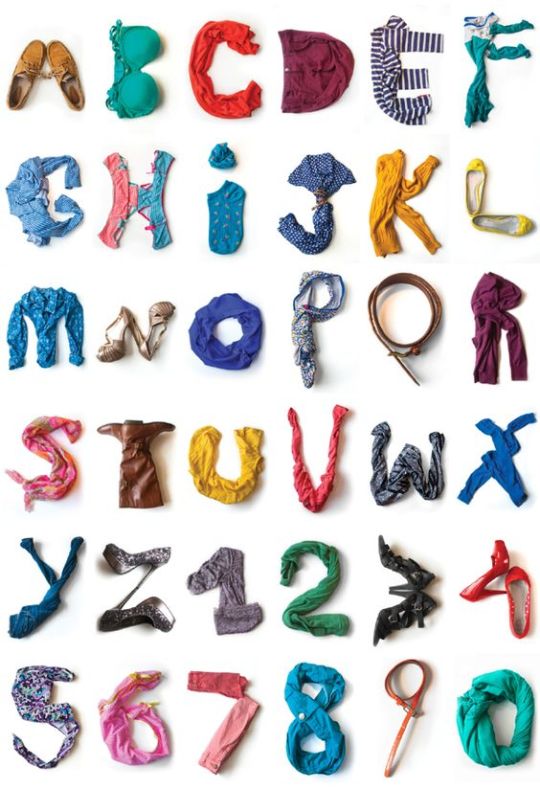




GENERATION OF IDEAS
Idea of growing ideas, and nourishment. Could be worded like: How do artistic juices run wild / flourish? Or how do you nourish creativity in design? How can ideas be plentiful? Food for thought. What fuels creativity? By using the key words ‘nourish’ and ‘plentiful,’ this gives me the opportunity to use food to build the letterforms. Specific ideas under food include:
-Using 100’s and 1000’s scattered and drawing letter with finger (figure ground)
-Donuts for O’s, this can add colour and playfulness
-Spaghetti as a way of producing a cursive, free flowing, organic aesthetic
-Broccoli, can be cut up in different ways and with the stem and the top it can variate the width within the letterforms
-Coffee cup from a birds eye view can create the letter ‘O.’
-Each letter is on a plate, this helps establish a unique composition and create a background context.
Idea of travel. Could be worded like: Where can design take me? When do good ideas lift off? What moves design? How does design shift between cultures and location?
-This could be interpreted inside of a suitcase by arranging objects such as Toiletries, money, keys, shoes, charger, sunglasses, etc.)
-This could be difficult as it is a restricted size to present a question with lots of characters.
-Where will design bring me?
-Where can design take me?
-Made out of clothing items (socks, shirts, skirts, long sleeves, bra)
How can designs be sustained? This can be made out of green objects and make a depiction through the symbolism of this colour. Or I can used recycled items to build the letterforms such as cans, bottles, cardboard, magazines, etc.
How can I stand out as a designer?
-Flamboyant colours used
-Objects that convey individuality - use items that mean something to me to create a more personalized and intimate version of the question.
How can design advance learning and education?
-Context of the coronavirus
-Books, rulers, stationary, etc.
What is the future for design?
-Electronic wires and gadgets to form type
-Tin foil
How can I grow as a designer?
-Can use plant life to support this question. Flowers, leaves, natural elements, food scraps etc.
How can design sway emotion?
What is it to be human?
How do you measure success?
How can I improve lives?
What stories will I tell?
Who will build the future of design?
- This could be built out of tools, string, blocks etc. Can focus on materials and methods within design and the physical act. Tape measure for letter D.
My finalist questions after my exploration were ‘How do you nourish creativity in design?’ and ‘Who will build the future of design?’ The first option was made of 33 letters and the second was made up of 29 letters. It was appropriate to choose the question with the least amount of characters as it needed to be scaled to fit within the one photograph. I also thought that the idea of using food had been over-exploited and didn’t want to orchestrate this idea alongside anyone else in my class. The accessibility to food at this time was critical as supermarket stock was declining with people over-purchasing and stocking up on goods, while it seemed to be an expensive to create 33 letters out of different foods. I also thought that by chopping, breaking and forming food to suit each letterform, it took away my creativity within the task and I was set on creating letterforms with fixed objects. By doing this, I was challenging myself at a more extensive level and I wanted to prove to myself that I could do it. This is why I chose the question ‘Who will build the future of design,’ and I planned that I will use tools from my dad’s workshop.
CREATION DAY
Upon entering my dad’s workshop, I didn’t have any pre proposed ideas of what I could use, I would just create with my findings and try to make them work as I went. I began by opening up each draw and digging through rusted nails, bolts, collections of spanners, brushes, clamps, plumbing utensils, tapes etc. With a creative mindset, I tried to visualize how each object I picked up could be used as any of my 29 letters. Some objects immediately lent themselves to certain letters such as the G clamp for the letter G, or the tape measure pulled out to create a D. For others, it was harder to facilitate a shape that could be recognized and was legible within my composition. This process was carried out by arranging the formed letters on the floor in the order of the question and paying attention to ways that I could make it appear individual yet bold. I used objects inside of other objects to decorate the letters, and give them a more stylized edge instead of a minimal appearance. Eg: I used a sink drainer in the centre of a curved edge to form a D.
When creating my letters, I had to pay attention in differing the appearance of same letters. While objects of the same family e.g.: rulers of different lengths and colours were often good for creating ‘L’s’ I had to make sure I only used that object once for each letter. This was at times difficult.



After hours of building my question, I was happy with the visual appearance and was ready to take it to the next level. There was not enough surface area on the floor of the workshop to lay out all of my tools in the correct sequence with spacing to ensure a balanced page layout, so I carried each tool inside to my room.
In my room, I placed a drop sheet on the floor in order to relate to the context of building and construction, while creating a visually dominating composition. By referring back to the photos that I had taken of the tools set out on different areas on the floor in the workshop, I was able to recognize the placement and type of tool used for each letter and within certain words. I then played around with the paragraph style of my question and the vertical and horizontal distance of the words. Originally I placed the “Who will build” on the first line, with “the future of” on the second line and “design” on the third line; however, it was too horizontal and I wanted my question to be more grouped together. I then rearranged the tools, so that there was less words on each line and it created an overall square shape in its spacing. I then framed the letters inside ruler edges on opposing corners and placed an outdoor glove on the top right hand corner to show a sense of craftsmanship and the idea that the process of building the future of design is never completed and it is an adaptive and ongoing process.

It was then, that I didn’t like the way the drop sheet reflected light as it is plastic and the colour of the dark blue took away the contrast from the tools. It was illegible and the dimensions of the drop sheet made it hard to photograph without my floor getting photographed. I then reverted to using a clean white sheet as a background, so the tools could be easily seen and cast shadows were visible.
When setting up the white sheet it came with it’s own set of challenges. The sheet had many wrinkles in it, so I resolved this by ironing it out on the floor, which was challenging as when crawling over parts on the floor, it became wrinkled again, or the material gathered in places. When placing the tools on the sheet once again, I wasn’t certain of the exact placement and when shifting them around the white sheet got dirty in places from the oil bathed tools, dust and dirt. This was resolved by editing out those spots on photoshop and smoothing the colour of the sheet. I chose my room to take the photos in as it has the most direct sunlight, however, as the window is on one side of the sheet, I used my LED makeup mirror to shine across the other side and brighten up the dark areas. As the tools are large in size, I then found it difficult in capturing the question in one single photo, so I stood on top of a high chair and hovered my phone high above the grouping of objects. This took a few trials and errors but eventually I got some even, well balanced shots, of which, I took onto Photoshop to edit and manipulate.

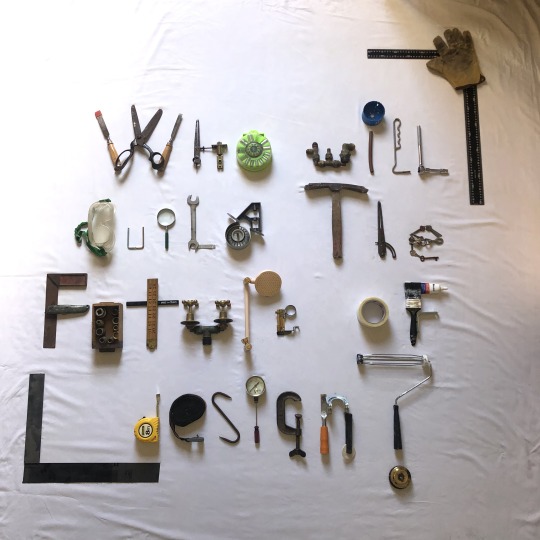
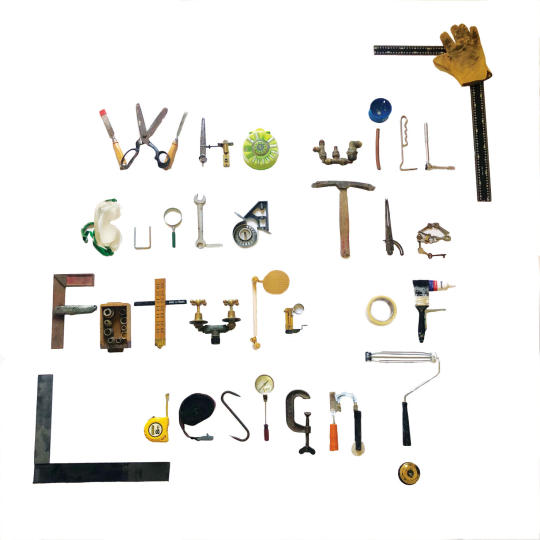
This assignment allowed me to extend my knowledge of how typefaces can differ and how humans perceive them. It allowed me to think outside of the box and use different materials and methods in aiding my idea development and concepts. It furthered my understanding of the raster-based program, Photoshop and how I can edit my photos. These skills can all be used in my future assignments and my other courses.
1 note
·
View note
Text
Well folx it’s that time of year again: the Starving For Allah festival begins shortly. (I’m only gonna be fasting in public this year and will be stuffing my mouth the second I get into my room, for the record.) As a Special Ramadan Series, I’ve dug through my asks to find the most common question that I get, and the resounding answer is: sectarianism!!! People raised Sunni, people raised Shia, and non-Muslims whose knowledge of this part of history is “some people think the fourth guy should have been first” all wanna know Shaikha Urfavmurtad’s hot take on the mess that unfolded following the death of our beloved prophet (PUBG). And I will give the ppl what they want!
Let me give you a brief rundown of the sources for everything that follows. Written Islamic history began in the mid-8th century, over a hundred years after these events unfolded, though it built upon a systematized oral learning tradition. By that point, the first two dynasties of Islam had faded away, and the third, called the Abbasid dynasty, was freshly in control of the majority (but not all) of the territory conquered by the first generation of Muslims. The Abbasids were descended from a member of Mohammed’s extended family, and this fact was essentially their sole claim to rulership. They engaged in constant propaganda against their predecessors, called the Umayyad dynasty, who by this point had been reduced to a tiny stub of their former territory. The Umayyads were descended from the same tribe as Mohammed, but were not specifically descended from his family within that tribe.
For reasons that will eventually become obvious, this means that all accounts of the complete political clusterfuck that was the caliphate in the 50 years following Mohammed’s death have to be looked at with some degree of skepticism. There were reasons why authors writing in this period would feel compelled to characterize certain individuals as evil or at least misguided and others as pure souls, and they doubtlessly exaggerated and embellished some reports. And even the reports that truly do seem to go all the way back to the first generations of Islam can’t be fully trusted--these people were talking about their own lives, defending their own actions and criticizing those of their political enemies. Despite that, we have enough solid reports from enough people on different sides of each divide to put most of the story together. The main events of the story actually don’t differ that much between sources--the differences are mostly in the ways people are depicted during those parts.
Full disclosure: I was raised Sunni. I do not have the emotional attachment to certain historical figures that Shia people do. Even non-religious Shia people have a tendency to cry when they hear some of the stories that we’ll talk about, whereas I just think “lol that’s a biT much tbh”. However, given my current belief that all of these guys were dumb assholes, I feel that I can offer my fairly unbiased take on which dumb asshole deserved to be King of the Dumb Assholes.
After reading this, I believe you’ll come to agree with my thesis statement, namely that the true hero of Islam is the one who probably didn’t even believe in the damn religion.
And so I present my pre-Ramadan gift: part one of The Death of Crazy Mo.
THE CAST OF CHARACTERS
THE QURAYSH: The tribe in charge of Mecca and essentially the only relevant people in the story. Prior to this whole fiasco, they made a living primarily as merchants, traveling along caravan routes to other lands. They also catered to polytheistic pilgrims visiting their shrine, called the Kaaba. Most of Mohammed’s early followers (including Mohammed himself) were from clans of the Quraysh. Though most of the Quraysh originally strongly opposed Mohammed, they were worn down by years of conflict and “embraced Islam” following the conquest of Mecca. The leader of the Quraysh’s military prior to Mecca’s conquest was Abu Sufyan, a member of the Banu Umayya clan. Abu Sufyan is the father of one of Mohammed’s wives (Ramla) and several other children, including a son named Muawiya. He and his sons “converted” the day Mecca was conquered and have served Mohammed ever since. Muawiya currently works as one of Mohammed’s scribes.
MOHAMMED: Some old guy from the Banu Hashim clan of the Quraysh. Spends most of his time in a state of fever-induced delirium while ranting about religious minorities. Had several children, but all but one--his youngest daughter Fatima--have died of disease.
ABU BAKR: A wealthy, well-connected merchant of the Quraysh who converted to Islam early on and brought a bunch of people into the religion. He knew his fellow merchant Mohammed before Islam’s creation and grew to become his best friend. Mohammed bestowed the title of “as-Siddiq” or “the Truthful” upon him when Abu Bakr affirmed his belief that Mohammed took a round trip to Jerusalem on a magic horse/donkey in the middle of the night. As the years went on, he established himself as Mo’s closest confidante and has been vested with a great deal of political and military authority in the Muslim community as a result. His daughter Aisha was married off to Mohammed as a child and has been his favorite wife ever since.
UMAR: A belligerent asshole from a well-known family of the Quraysh who was also an early convert. He is another one of Mohammed’s fathers-in-law via his daughter Hafsa. Everyone knows that Umar is unpleasant, but they are forced to tolerate his existence because Mohammed and Abu Bakr are his buddies. Serves as The Big Guy and is good at yelling at people to whip them into shape.
UTHMAN: A wealthy merchant and old friend of Abu Bakr’s, who converted at the latter’s insistence. Went on to marry two of Mohammed’s daughters, Roqaya and Umm Kulthum, both deceased at this point in time. As such, he is also a member of Mohammed’s inner circle. He is from the Banu Umayya clan, meaning that Abu Sufyan & Sons are his relatives. This will cause drama later on.
ALI: Mohammed’s cousin (the son of his father’s brother) and son-in-law via Fatima, with whom he has two young daughters and two young sons, Hasan and Hussein. Mohammed was raised by his uncle, Ali’s father Abu Talib, after his own parents died. As an adult he returned the favor and helped raise Ali when Abu Talib was in a tough financial situation. Ali converted essentially right away as a teenager due to the fact that he lived with Mohammed and his family. He has been one of the Muslim army’s most notable soldiers since his early twenties and is one of the most prominent members of the community despite his relative youth. Like his father and cousin, he is a member of the Banu Hashim clan.
ABBAS: One of Mohammed’s uncles (his father’s brother), though the two are actually very close in age. Originally a successful spice merchant, he converted to Islam shortly before the conquest of Mecca and served in his nephew’s army. His son Abdullah ibn Abbas is only a teenager at the moment, but he will be relevant in the future. From the Banu Hashim.
THE ANSAR: The Muslims from Medina, mostly from the Aws and Khazraj sister tribes. After getting kicked out of Mecca (because the Ansar pledged to assist him in battle and the Quraysh learned of this stunt), Mohammed moved to Medina and brought a couple hundred of his followers from Mecca with him. Medina became the Muslim base of power, and the heads of the two tribes were made essentially subservient to him. Anyone who opposed him was gradually “dealt with”, and now the Ansar are more or less 100% Muslim. Whether their loyalty extends to Mohammed’s entire tribe is an open question.
MUSLIMS WHO ARE UNRELATED TO THE ANSAR OR QURAYSH AND NON-MUSLIMS IN GENERAL:

PROLOGUE: IN WHICH THE JEWS AND/OR COCCOBACILLI BACTERIA ARE AT IT AGAIN
Mohammed falls sick with a sudden, debilitating illness. We don’t know exactly what it was, and it’s blamed on The Devious Jews in many sources, but it was clearly one of the many infectious diseases that battered the Middle East throughout the sixth and seventh centuries. Islamic sources state that Medina in particular endured some sort of plague around that the time. He’s described as becoming shaky and fever-ridden essentially overnight, and so his companions put him on bed rest.
His condition is not improving, and it soon becomes obvious to everyone, including himself, that he is probably going to die. His followers move him into the home of his youngest and favorite wife Aisha, and he is given around-the-clock care. Mohammed’s fever worsens, though he remains lucid for most of his illness. He spends most of his time in bed, but sometimes he gets up and is sort of dragged around with the help of a couple of guys.
A few things happen around this time that will be relevant later. First of all, due to Mohammed’s illness, he can no longer perform his role as the imam (leader of prayers). So he appoints Abu Bakr to fill in for him. Abu Bakr has been Mo’s bestie and a member of his inner circle for decades, so this doesn’t surprise anyone. But appointing someone the leader of Medina’s prayers has certain implications.
The immediate issue is that Mohammed serves as the head of his state’s government, military, and legal system in addition to serving as the head of its official religion, Islam. Whoever succeeds him as the leader of this state--which is in a constant state of warfare in order to extend its borders--will likewise have to serve a triple role as a religious, military, and political authority figure. This will not be easy, as the new Islamic nation includes a number of people who are not particularly happy about living under its rule, and their numbers grow every month as the attacks continue. Ibn Ishaq’s sira states that before he fell ill, Mohammed had ordered raids both south and north, into Yemeni and Syrian territory. His nation is still almost entirely located in Arabia in this era, but it is getting quite large and complex, and there isn’t really any appropriate bureaucracy to deal with it. Whoever takes over will have to come up with that on his own, and will need everyone to go along with his decisions. Mohammed’s own claim to rulership comes “from Allah”, and it looks like Allah isn’t interested in conferring the same honor on anyone else.
That brings us to the second thing, which is something that did not happen: Mohammed never actually stated who he wanted to succeed him. In hindsight, this is a puzzling decision. By this point in the story, Mohammed knows he is seriously ill and probably going to die. He is pretty old (a grandfather in his sixties). He is very sick, but he’s still able to communicate with people in a clear manner, until, like, the very last day of his life. And he’s always been more than happy to issue orders for how his followers should eat, shit, and breathe, in addition to a litany of other religious, social, and political rules. Why he not only neglected to name a successor but even a process by which that successor could be named by others is a mystery. He just evidentially made virtually no preparations for what would happen after his death. Maybe he was in denial--he obviously wasn’t planning on dying at that point, and had unfinished business related to conquest and/or ethnic cleansing. Maybe he thought he had a little more time. Maybe he believed it was obvious that he wanted Abu Bakr to succeed him. In any case, he never named his “heir”.
There is one hadith narrated by Abdullah ibn Abbas that is sometimes believed to be related to this topic:
When [Mohammed] was on his deathbed and there were some men in the house, he said, 'Come near, I will write for you something after which you will not go astray.' Some of them said, 'Allah's Messenger is seriously ill and you have the Qur'an. Allah's Book is sufficient for us.' So the people in the house differed and started disputing. Some of them said, 'Give him writing material so that he may write for you something after which you will not go astray,' while the others said the other way round. So when their talk and differences increased, Allah's Apostle said, "[Get out]." Ibn `Abbas used to say, "No doubt, it was very unfortunate (a great disaster) that Allah's Messenger was prevented from writing for them that writing because of their differences and noise."
What was he going to write? (“Wait, I thought he was illiterate!” was he tho) Another hadith says one of his last orders related to the state was just a “remember to FUCK UP the polytheists, lads” thing, and Ibn Ishaq’s sira says that his last command was to "let not two religions be left in the Arabian peninsula". But that can’t be what we’re talking about, because everyone already knew that Operation Bring Everyone Into The Loving Embrace Of Islam was the plan. They didn’t need it written out for them. A third hadith informs us that Umar was one of the people who refused to give Mohammed something to write with, believing him to be delirious and declaring that the Quran contained all the instructions they needed anyway (lolololol). So because of goddamn Umar, we really don’t know for sure what Mohammed meant to do there.
A story involving Ibn Abbas’ father, Abbas, provides a hint as to what some people wanted him to write:
[Abbas said to Ali:] “By Allah, I think that [Mohammed] will die of this illness. I recognise death in the faces of the Banu Abdu'l-Muttalib when they are dying. Let us go to [Mo] and ask him who will have this authority. If it is for us, then we will know that, and if it is for other than us, we will know it and he can advise him to look after us." Ali replied, "By Allah, if we ask him for it and he refuses us, then the people would never give it to us afterwards. By Allah, I will not ask it from the Messenger of Allah."
Abbas and Ali here are both from Mohammed’s clan, the Banu Hashim. (Abdul-Muttalib was Mo’s grandpa.) When Abbas says that he wants to know if Mohammed’s empire “is for us”, he means for their clan. So while Mohammed is dying, it’s clear that at least some people believe that he might keep the leadership of the state/theocracy/whatever within the family. If Mo did opt for that, Ali was a reasonable choice. He was young--like 30 years younger than Abu Bakr & Pals--but he had been vested with a great deal of military authority already, he had been given the honor of carrying Mohammed’s banner in battle, and he was the closest thing Mohammed had to a son (besides Zayd the Ignominiously Un-Adopted, but he’s dead by now so whatever). Mo was very protective of his almost-son/cousin, as evidenced in this adorable hadith involving slave rape, and described him as the Aaron to his Moses. He told everyone that they must view Ali as their ally (some of Ali’s followers would later interpret this as Ali being declared Mohammed’s heir, though it was obviously not viewed as such at the time).
But again: at this point, Mohammed’s days are numbered, and he hasn’t indicated he wants Ali or anyone else to succeed him. And Abu Bakr is the one leading the prayers. It’s easy to dismiss the whole account above as some dumb Abbasid story--the Abbasids are so named because they are descended from Abbas--but it seems like it either actually happened or was strongly believed to have actually happened by the early Muslims. That’s because there is a sort of competing hadith to the one about the would-be letter declaring Ali the rightful caliph, this one narrated by Aisha and involving a would-be letter declaring Abu Bakr the rightful caliph:
A'isha reported that Allah's Messenger (ﷺ) in his (last) illness asked [her] to call [her father] and her brother too, so that he might write a document, for he feared that someone else might be desirous (of succeeding him) and that some claimant may say: “I have better claim to it”, whereas Allah and the Faithful do not substantiate the claim of anyone but that of Abu Bakr.
So the idea that Mohammed was going to write something related to the succession seems to have truly been A Thing in the first generation of Islam, with different camps offering different spins on what he wanted to write. Obviously, no letter was ever actually written, thus the problem. But there were plenty of reasons why Abu Bakr also made sense as Mohammed’s successor, apart from his high standing in the community and his appointment as the designated imam. He was fanatically loyal to Mohammed and had joined him in holy broship, so he was viewed as unlikely to “betray” Mo’s final wishes. Mohammed had entrusted him with increasing religious authority even prior to his illness, and in the year following the conquest of Mecca, Abu Bakr had been put in charge of the pilgrimage to the Kaaba. He had also led platoons of Muslim soldiers (more slave rape in that one jsyk!) and was treated as essentially a substitute teacher at times:
A woman came to the Prophet (ﷺ) who ordered her to return to him again. She said, "What if I came and did not find you?" as if she wanted to say, "If I found you dead?" [Mohammed] said, "If you should not find me, go to Abu Bakr."
Plus, the guy was old. Around Mohammed’s age, actually, in a society that prized the wisdom of elders. So Abu Bakr had quite a bit going for him at this juncture. The one thing he permanently lacked was Ali’s close blood relationship to Mohammed--and Ali held multiple advantages here. It wasn’t just that he and Mo were cousins, it was also that Ali was the husband of Mohammed’s daughter and the father of Mohammed’s only grandsons. Abu Bakr’s daughter was Mohammed’s wife, but neither she nor any of Mohammed’s other wives from his polygamous days had any surviving children. Fatima’s boys were the only males around with his blood. (Mo had granddaughters too, from both Fatima and one of his other daughters; the latter granddaughter also ended up marrying Ali.)
A final note is that not all Muslims were eager for either Abu Bakr or Ali to succeed Mohammed. Some weren’t interested in living under permanent Qurayshi rule. In particular, the Ansar of Medina wondered why exactly the Quraysh were seemingly destined to rule them just for being related to Mohammed, when the Ansar were the ones who sheltered Mohammed and his followers for years after the Quraysh kicked him out of town.
As people ponder all of this and the power struggles start to heat up, Mohammed is still in his bed, dying of disease. Oh, and just a teensy problem: some people have gotten word of his illness and think that now is a great time to try their luck and break away from the proto-caliphate. Some are in open revolt and refusing to pay tribute to the state, while others have even declared competing religious movements and have started building up their own armies. Mohammed’s successor, whoever he is, will have a lot to deal with. As all of these people will learn within the next two decades, it turns out running an enormous expansionist state is actually a shitty job with a lot of headaches, many of which involve being stabbed to death.
CHAPTER 1: PRESS ﷺ TO PAY RESPECTS
Despite his followers’ best attempts to cure him by using the “methods” he’d taught them, Crazy Mo dies in Medina around noon on a hot June day in the year 632. He was 62 years old, and had served as the self-declared prophet of Islam for the last two decades of his life.
The Muslims are, naturally, distraught by their leader’s death. Mohammed’s wives immediately begin hitting themselves (uhh... it was a custom) in mourning when his heart stops in Aisha’s room. The news slowly spreads. Some wail; others are frozen in fear. Some like Umar take a more denial-of-reality approach to hearing the rumors. He addresses a crowd of people and begins rambling:
When the apostle was dead, Umar got up and said: "Some of the disaffected will allege that the apostle is dead, but by God he is not dead; he has gone to his Lord as Moses went [for] forty days, returning to them after it was said that he had died. By God, the apostle will return as Moses returned and will cut off the hands and feet of men who allege that the apostle is dead."
“SO THIS MOUNTAIN, SEE?!”, exclaims Umar, who is in a state of mania. “THE MOUNTAIN IS JUST, LIKE, IN AISHA’S APARTMENT. ALLAH MOVED IT THERE, THEN SHRANK IT, THEN MADE IT BIG AGAIN, BUT YOU CAN’T SEE IT FROM HERE--LIKE THE MAP OF NI NO KUNI, YOU KNOW?--AND THE PROPHET CLIMBED IT TO GET SOME TABLETS LIKE MOSES. HE’LL BE BACK WITH THOSE TABLETS, WHICH WILL SAY ‘FUCK Y’ALL’, AND THEN HE’LL MURDER EVERYONE WHO SAID HE WAS DEAD. YOU’LL SEE!!!”
“That sounds incorrect, but I don’t know enough about mountains to say it is false,” decides an onlooker, thoughtfully.
Abu Bakr pushes through the crowd that has gathered to gawk at Umar. He visits Aisha’s room to observe Mohammed’s corpse and confirm his death. Satisfied with the deadness of the body, he returns to Medina’s center to put a stop to his buddy’s maniacal ranting:
Umar was still speaking and he said gently, "Umar, be quiet." But Umar refused and went on talking, and when Abu Bakr saw [this] he said: "O men, if anyone worships Mohammed, Mohammed is dead, but if anyone worships Allah, Allah is alive". Then he recited this verse: "Mohammed is nothing but an apostle. Apostles have passed away before him." By God, it was as though the people did not know that this verse had come down until Abu Bakr recited it that day.
(Hmmm at that last part.)
“Umar,” says Abu Bakr, gently.
“BRO! YOU’RE WITH ME, RIGHT? EVERYONE’S SAYING ‘THAT’S THE DUMBEST FUCKING THING I’VE EVER HEARD’, BUT THEY SAID THE SAME THING ABOUT THE FLYING DONKEY, YOU WERE THE ONLY ONE WHO BELIEVED!! NOW YOU’VE GOT MY BACK, RIGHT?”
“Of course,” Abu Bakr replies, sweetly. He then slaps Umar across the face.
Stunned, Umar shuts up for a moment and everyone accepts that Mohammed is, in fact, dead and had not somehow gone missing inside his wife’s bedroom.
Mohammed’s only surviving child, his daughter Fatima, is obviously among the most devastated by his passing. Fatima’s mother Khadija had died when she was still a young girl, her sisters all died of disease within the previous five years, and none of her brothers survived their childhoods. Even Zayd the Ignominiously Un-Adopted is gone. So she is the last of her nuclear family at the age of, like, 25 or younger. Her husband Ali is presumably equally distraught, but as one of Mohammed’s closest surviving male relatives, he has to deal with the burial arrangements. Abbas helps Ali wash Mohammed’s corpse, in keeping with Islamic custom. They respect Mohammed’s never-nude wishes and keep his privates covered during the process.
Meanwhile, the news that Mohammed is dead has spread throughout the entire city. The issues that people had previously been grumbling about, related to the succession to Mohammed, immediately start spilling out into the open. The Islamic empire is engaging in constant, ongoing battles--if a new leader is going to be chosen, it has to happen now. There isn’t any time to waste.
But not everyone is convinced that there needs to be a singular leader. Some of the Muslims believe that Mohammed was irreplaceable in terms of being one single authority figure to whom all Muslims were required to pledge their absolute loyalty. He “earned” that loyalty by being The Prophet, and he was The Last Prophet. He couldn’t have a real successor. People who followed this line of thinking began seriously considering the possibility of de-centralizing the new empire, so that different Muslim tribal confederations would be more or less self-governing, as they had been prior to Islam. After all, Arabs were accustomed to living in tribes, not bureaucratic nations. Why not just return to the way things were, with slightly more attacks on polytheistic shrines?
The Ansar are intrigued by this possible outcome. They know that if there is one single ruler, he is doubtlessly going to come from the Quraysh tribe, and they’ll be relegated to the back seat forever. In the interest of preserving their autonomy (or rather renewing it, now that Mo’s dead), they quietly arrange a meeting to discuss this problem. The goal of the gathering is to agree upon a leader for their community, with Saad, a chief from one of their tribes, being the current frontrunner. They invite the senior members of their tribes to the meeting and pointedly do not invite any of the Quraysh. But some of the latter get word of the gathering, and they move to crash the party immediately.
I (Umar) said to Abu Bakr, 'Let's go to these Ansari brothers of ours.' .... we reached them at the shed of (a clan of the Ansar, the) Bani Sa`da.
After we sat for a while, the Ansar's speaker said, ‘...To proceed, we are Allah's Ansar (helpers) and the majority of the Muslim army, while you, the emigrants, are a small group and some people among you came with the intention of preventing us from practicing this matter (of caliphate) and depriving us of it.'
When the speaker had finished, I intended to speak as I had prepared a speech which I liked ... Abu Bakr said, 'Wait a while.' I disliked to make him angry. So Abu Bakr himself gave a speech ... he said, 'O Ansar! You deserve all (the qualities that you have attributed to yourselves), but this question (of Caliphate) is only for the Quraish as they are the best of the Arabs as regards descent and home, and I am pleased to suggest that you choose either of these two men, so take the oath of allegiance to either of them as you wish.’ And then Abu Bakr held my hand and Abu Ubaida bin al-Jarrah's hand
“Hello friends,” Abu Bakr begins. “Y’all are great. Truly. Thanks for opening your homes to us, surrendering control of your city to our cult leader, and sacrificing your money and lives in battle on his behalf. But here’s the thing, folks: we’re better than you are. I’m sorry but these are the facts. We’re richer. We’re from a more well-developed city. Our tribe is more respected. Abraham himself built a mosque where we live. Mohammed was one of us. Frankly, we’re also better-looking. That’s very important for good PR.”
The Ansar stare blankly at him.
Undeterred, Abu Bakr continues: “Now, we’re not going to force you to follow anyone. There is no compulsion in religion. You have a choice here--between two of our tribe’s most famed assholes!” He grabs two individuals from the crowd and presents them. “On your left: Umar ibn al-Khattab, who many of you know as a short-tempered and over-emotional manchild. On your right: this other guy named Abu Ubaida, who honestly hasn’t done much beyond fight in some battles at this point in the story. I guess there was that time he killed his own father while we were trying to raid one of our tribe’s caravans.... anyway. What are y’alls thoughts?”
[Crickets.]
And then one of the Ansar said, 'I am the pillar on which the camel with a skin disease (eczema) rubs itself to satisfy the itching (i.e., I am a noble), and I am as a high class palm tree! O Quraish. There should be one ruler from us and one from you.'
“OK... first of all, what in the name of Christ is that metaphor,” Abu Bakr replies. “We’re also better at poetic imagery than you are. Forgot to add that, so thanks for reminding me. Second of all, as I just told you, we’re above you. Who the fuck lied to y’all and said you were on our level? Lmao losers”
“We’re not better than fucking UMAR?”, the Ansar retort. “Or this other guy who will remain B-tier in relevancy throughout this entire story?! YOU WOULDN’T EVEN HAVE THIS EMPIRE WITHOUT US, YOU UNGRATEFUL CLOWNS!”
Chaos erupts in the hall. People are five seconds away from throwing hands. Suddenly...!
Then there was a hue and cry among the gathering and their voices rose so that I was afraid there might be great disagreement, so I said, 'O Abu Bakr! Hold your hand out.' He held his hand out and I pledged allegiance to him, and then all the emigrants gave the Pledge of allegiance and so did the Ansar afterwards. And so we became victorious
Umar dramatically declares his loyalty to Abu Bakr in the chaos, recognizing him as the new leader of the Islamic empire, henceforth known as the caliph. Frankly speaking, it probably wasn’t that much of a shock to Abu Bakr himself, as he knew that Umar (and... basically everyone else) wanted him to be the first caliph. The whole offering Umar and Abu Ubaida as options thing was just false modesty he knew would be shot down in favor of himself, imo. But that’s my hot take, not something the sources say.
Anyway, everyone pauses for a moment to consider this. It probably seems clear to the Ansar at this point that the Quraysh aren’t gonna just leave them alone and let them do what they want; they will have to pledge loyalty to one of these guys eventually. Given that their previous options were Umar and Irrelevant Guy, Abu Bakr likely appears pretty good in comparison. So perhaps it’s not surprising that most of the Ansar present at this gathering decide: “if we gotta serve one of these assholes, might as well be this one”. They sigh and agree to recognize Abu Bakr as the caliph. (Poor Saad gets roughed up afterwards, something Umar considers punishment for daring to even consider himself for the position of caliph.)
So now the whole succession issue is behind us, right? Well... no. We have a slight problem here: Abu Bakr, Umar, and Abu Ubaida may have crashed the Ansar’s party, but zero members of the Banu Hashim were present at the impromptu coronation of their kinsman’s successor. Because they’re busy preparing his corpse for burial. Oh well!

Team Abu Bakr has a more pressing concern, namely telling everyone else in Medina (and those hundreds of thousands of other people living in the caliphate, but who gives a shit about them?) that they have a new ruler. So the next day, Umar and Abu Bakr direct a general assembly to gather in Medina’s mosque, where the people are told to give Abu Bakr their allegiance. First, Umar gives a brief speech in which he basically says that this decision hadn’t come from Mohammed, but is nonetheless the evident “will of Allah”:
O men, yesterday I said something based on my own opinion and which I do not find in God's book, nor was it something which the apostle entrusted to me; but I thought that the apostle would order our affairs until he was the last of us alive. ... God has placed your affairs in the hands of the best one among you ... so arise and swear fealty to him.
The residents of Medina do so, and then Abu Bakr gives his own speech in which he asks the people to “obey me as long as I obey God and His apostle”. Then he leads them in prayer, acting as the caliph for the first time. The commoners apparently don’t have much of a problem with any of this, or at least none are bold enough to disagree with the leaders of their tribes after the latter swore loyalty to Abu Bakr in the hall. So that takes care of that situation.
But the larger issue, namely the fact that the Banu Hashim and their sympathizers have had basically no say in this process, is still unresolved. Mohammed’s burial occurs the day after the general oath of fealty to Abu Bakr, with the men of his extended family lowering him into his grave. They’re now ready to catch up on everything they’ve missed in the past couple of days. It probably isn’t anything important, since the people of Medina have no doubt been so preoccupied with mourning Mohammed’s death that they’ve hardly had time to do anything else.

(On to part 2!!)
32 notes
·
View notes
Text
Danganronpa V3 Commentary: Part 3.3
Be aware that this is not a blind playthrough! This will contain spoilers for the entire game, regardless of the part of the game I’m commenting on. A major focus of this commentary is to talk about all of the hints and foreshadowing of events that are going to happen and facts that are going to be revealed in the future of the story. It is emphatically not intended for someone experiencing the game for their first time.
Last time, in what is probably my favourite segment of chapter 3 in that it makes the most of Kaito before he becomes non-functional for the rest of it, we hung out with him and established his very unique definition of the word “sidekick”, then he promptly made Maki into one of said sidekicks by dragging her to training and convincing her to begin to change, even if she isn’t quite admitting that to anyone yet.
We start off the day with everyone being called to the gym for what is going to be the presentation of the next, uh, “motive”.
Kaito: “Nah, I’m going. I just gotta take care of something first, then I’ll meet you there.”
Shuichi: (Kaito pointed at the door to Maki’s room. I suppose he’s going to take her.)
Kaito is still constantly thinking of Maki, assuming that she still won’t want to take part in anything that involves the whole group and making a point of persuading her to do so. Partly this time it’s because she might get in trouble with Monokuma (or, well, the kubs) if she doesn’t come, but also it’s because he’s still trying to get her to feel included.
Kiyo: “I usually wake up at 6:00 a.m., since it takes me so long to get ready each morning.”
Shuichi: (Why does it take so long? Isn’t that even longer than what a girl takes?)
While this is obviously meant to be taken as a hint at Kiyo’s true nature of being “possessed” by his sister, I should also point out that this is an example of Shuichi being vaguely misogynistic, with the way he’s assuming that obviously girls always take longer than boys to get ready in the morning. Just goes to show that these kinds of lines really shouldn’t be taken as anything particularly telling about the character who says them unless they’re clearly connected to something that’s been strongly established about that character, and should instead just be considered a scattered background noise of Danganronpa’s awkward writing.
(This game’s writers should be perfectly aware of the fact that some guys can take a while to get ready in the morning too, given Kaito, who probably takes forever to get his hair like that.)
…Oh boy. I’m about to talk to Himiko, on this particular morning, while carrying at least one Gun of Man’s Passion. Here we fucking go. Welcome to another one of the many stupid things in this chapter that contribute to it being the worst one.
Shuichi: (Suddenly, a thought flashed into my mind! A… man’s… fantasy… Wh-Where is this thought coming from?)
You know where I think this thought is coming from? A Flashback Light. The half-balding Monokuma shows up out of nowhere to stare intently at Shuichi before he suddenly has this thought. It’s already been established that Flashback Light properties can be in other things, such as the Kubs Pads. Why not Monokuma’s eyes?
It should be obvious that peeking on the girls is so ridiculously out of character for Shuichi that he would never even remotely consider it under normal circumstances. Him not being that kind of person is literally a vital plot point – if Shuichi were someone who’d happily peek on girls, then he also wouldn’t have had a problem with going into the girls’ bathroom to check it for hidden passages for the sake of detective thoroughness, and this whole killing game would have ended without anyone (except maybe Rantaro) dying.
So there should be a very good reason that Shuichi would suddenly have this thought that isn’t just the game’s terrible writing for the sake of fanservice. I appreciate that the game hints at the true reason with the way Shuichi wonders where this thought came from. He even specifically uses the word “flashed” to describe it appearing.
…It’s still not great, because even if the game tries to hint towards this being in-universe terrible writing for the sake of fanservice, that… doesn’t actually make any sense. The in-universe audience are “playing” as Keebo, not Shuichi. And maybe they also have access to some of the Nanokumas’ feeds for if they get bored of watching Keebo, but then they’d be able to peep on the girls themselves without Shuichi needing to get involved.
Anyway, I declined the decision to actually go and do so, because Shuichi is better than that (and I have precisely zero things to say about the fanservice part itself). Resist the Flashback Light, Shuichi! Don’t let yourself become a badly-written vehicle for fanservice!
Shuichi: (No… I shouldn’t be peeking. I can’t let Monokuma manipulate me…)
This is also pretty telling. That’s exactly what Monokuma was trying to do.
Even though she came to the gym, Maki is still standing at the outskirts, apart from everybody else.
Kokichi: “Hey guys, am I sleepwalking or something? What’s she doing here?”
There’d been a little bit of conversation in the gym before Kokichi said this, and nobody else cared that Maki was here. Even if they’re scared of her, they accept that she should be at compulsory gatherings. Only Kokichi is still being a dick and trying to insist that she’s the awfulest terriblest person who shouldn’t be allowed near anyone for any reason.
Kaito: “Don’t say something so stupid. You’ll never get to know her better if you never talk to her!”
Kaito is so damn right. Communication is important! If you don’t understand someone, then make an effort to learn instead of automatically assuming the worst of them! Kaito himself is always trying to understand the people around him, but he sees it as important enough that he believes everyone else should do so too.
Kokichi: “Maybe everyone would prefer that this dangerous killer stays far away from us!”
But of course Kokichi is convinced that even if they did get to know her better it’d only confirm that she’s a horrible person who should stay away from them, because he can’t ever not automatically assume the worst of everyone.
Kokichi: “Of course, I wouldn’t prefer that at all!”
…Yeah, right, when you’re the only person who even complained that she’s here today and have been the most unshakably convinced that she’s dangerous out of anyone.
As I’ve mentioned a few times before, Kokichi’s really just a gigantic coward.
Angie: “Nyahaha! It doesn’t matter what the motive is, we will not do the killing game anymore.”
Tenko: “Th-That’s right! We aren’t afraid of anything anymore!”
Heh, look at Tenko stuttering a little as she agrees with Angie, because she’s not really on her side. She does agree that they shouldn’t do the killing game, of course, but she’s really not okay with Angie’s methods.
Monophanie: “This motive will inspire fear like never before.”
It technically will, but… only to Kaito, not to anybody else.
So, uh, let’s talk about this supposed resurrection right now. The Monokubs insist that it is possible to do so, even though we never confirm or deny this because Angie never finishes the ritual. First time around, this claim was yet another thing that made me think of the virtual reality angle, but I was still sceptical that they’d pull that again when it wouldn’t be a surprise this time. However, knowing the full truth of the situation, even though it’s not a virtual reality, it still… might be possible to resurrect people? Sort of.
What it comes down to is how good cloning technology is in this universe and whether Team Danganronpa have the ability to clone someone and then speed-grow that clone to match the original’s physical age. If they could do that, they could have pre-made clones of everyone, then take the relevant person’s clone and flash them with a Flashback Light of their backstory, plus memories of everything that happened in the killing game until their death. That would accurately recreate that character and make it look like they’d come back from the dead.
If they don’t have this cloning technology, it’d still be technically possible, but the “resurrected” person would have an entirely different physical appearance to before, because Team Danganronpa would have to use some volunteer who’s willing to die and give up their body to be on Danganronpa (which we know there’s more than enough people wanting to do). But they’d still be the same character, if they were shown the same Flashback Light as the original character was.
However, it’s much less obvious how this is in any way supposed to be a motive for murder. (Yes, Monodam is claiming it’s actually a motive to “get along”, but we all know Monokuma is still really calling the shots and would have presented the same motive if he’d been here.) The real motive for this chapter already exists, in Kiyo’s lab, because the writers were lazy and decided it’s time to have a murder be caused by the fact that one of the cast is already a serial killer anyway. The only way in which the Necronomicon could be related to that motive is if it isn’t going to successfully resurrect anyone, and the writers are assuming that after it fails, Kiyo will use that as an excuse to offer a seance to at least talk to the person they were trying to resurrect.
Kaito: “D-Don’t say such a stupid thing! There’s no way resurrecting the dead is possible! I-It just can’t happen…”
Oh, Kaito. This is the point at which we lose him – in terms of his ability to be his usual self – for most of the rest of this chapter. Which also might be one of the reasons I’m not as personally fond of this chapter. Less Kaito is always going to be less fun than more Kaito.
Shuichi: “What’s wrong, Kaito? You don’t look well…”
Kaito: “N-No… it’s nothing. I’m just… not feeling so good.”
Shuichi: (All of a sudden?)
Aww, Shuichi already noticing something’s wrong and being worried. He’s also perceptive enough to pick up on the fact that it happened oddly suddenly. Kaito is of course trying to just play it off as not a big deal and just him feeling a bit unwell – but really, that’s not such an inaccurate way of describing it.
Angie claims the resurrection ritual might actually mean that all the dead bodies so far have been fake.
Tenko: “They were imitations? I-I see… I never would have thought of that!”
Tenko clearly does not actually think that at all and kind of hates having to pretend to mindlessly agree with Angie.
The writing in the courtyard has had more added to it. So I suppose at this point, Kokichi has begun his plan to try and gradually drop hints that he’s the mastermind.
We witness Gonta getting brainwashed by Angie in like two minutes flat in front of everyone. It’s not surprising that it’d be so quick for him, because he’s so naïve and easily manipulated.
Angie: “Nyahahaha! See how much everyone needs you, Gonta? You should definitely join.”
Gonta: “…You need Gonta? Okay! Gonta join student council too!”
Poor Gonta – he just desperately wants to be able to protect everyone and to be useful, but he has no idea how to do that on his own. So the moment anyone tells him that him doing a certain thing will be helpful to everyone, he immediately jumps at the chance to do so without questioning it. It happened last chapter thanks to Kokichi, and now it’s happening again.
Angie apparently already brainwashed Keebo, Tsumugi and Tenko at some point yesterday. Out of these three, Tenko and Tsumugi are both only pretending to be brainwashed (for very different reasons), so only Keebo actually needed brainwashing, but still, Angie would have had to at least go through the motions at Tenko and Tsumugi before they could believably start acting that way.
Kokichi: “But… I’m surprised Tenko decided to join the student council.”
Kokichi has clearly figured out that Tenko never would and she’s just pretending. He’s probably trying to call her out on her lie, but she manages to handwave it for now.
Shuichi: (It’s true that they’re probably not going to listen, but you could at least help too, Kaito…)
Kaito: “…”
Shuichi: (What’s wrong with him? He’s been quiet this whole time.)
Shuichi knows Kaito more than well enough to know that he would usually be objecting to this! The general message of this student council is that nobody should think for themselves except Angie, which is exactly the kind of thing that Kaito would have some very pointed thoughts about if he were functional right now. It’s kind of a shame that we have to miss out on those.
As everyone disperses from the gym, Kaito is feeling bad enough that he holes himself up in his room and is going to be there for the rest of this chapter’s free time. That said, it turns out you can actually hang out with him during this one first slot today, although not the rest of them. I guess he at least tries to make the effort at first but then gives up because his phobia starts getting to him too much for him to want to spend any significant amount of time in front of Shuichi and risk him noticing.
This is also the first point at which you can hang out with Maki! The thing she needed for her to finally be willing to open up was Kaito getting through to her last night.
Maki: “…Sure.”
Shuichi: “Really!?”
Maki: “…What’s with your reaction? You’re the one who invited me.”
Shuichi: “S-Sorry, I was just surprised. I honestly thought you’d reject me.”
Maki: “…All this time, I assumed I was just going to train with two idiots, you and Kaito… And I thought it’d be faster to give in to Kaito’s demands…”
Nope, Maki, you’re not just going to train with them, you’re going to be friends with them now! I like that there’s this whole exchange between them here, properly addressing the fact that Maki hasn’t been willing to hang out before but is now, and that Shuichi still wasn’t even sure if she’d be up for it. It’s by far the longest pre-FTE invitation dialogue in the game (this isn’t even all of it), but it deserves that.
However, as much as I would really like to because this exchange definitely makes this feel like the most appropriate time for Shuichi to start hanging out with Maki, I’m… not going to just yet. I’m still trying to make the FTEs I do line up with canon as much as possible, and if I do this now, I won’t be able to get that to work, for reasons I’ll explain later.
So instead, we’re hanging out with Gonta again. Partly this is just because since I’ve started his events I intend to finish them, but also we can pretend that Shuichi is once again worried about Gonta and trying to drag him away from being brainwashed by someone. He has become a one-man Protect Gonta From Manipulation Squad. (Just not a very successful one.)
Gonta: “Shuichi, you should join student council! Work hard with Gonta to help everyone!”
Shuichi: (Should I hang out with Gonta for a while?) [Yes]
Gonta: “Hehe… Gonta so happy that Angie and others need Gonta’s help.”
Guuuhhhh. Gonta just sees the student council as an automatic force for good because its members say so while being completely incapable of noticing how sinister it all is. He’s not even particularly into the Atua part of it – he just wants to be useful.
(Since Gonta’s in the A/V room right now, he and Shuichi end up watching a bug documentary together to help Gonta fill up on fight. Not sure how much Shuichi appreciated that, but at least he was polite enough not to complain.)
Shuichi: “What do you think a ‘gentleman’ is, Gonta?”
Gonta: “Gentleman excellent man! Best man, even!”
Gonta’s not very good at articulating it, but this really is the core of what it means to him. It’s not about doing specific things so much as it’s about being the best kind of person you can possibly be.
Gonta: “Gentleman behave like a gentleman! Kind, earnest, refined, polite…”
Gonta already is all of these things! Except maybe refined. These are things that are more in line with the traditional view of a gentleman than Gonta’s vague “the best person ever” description, but this is still a part of that. They’re the traits that Gonta values the most in people, both in himself and others (which is why he already has most of them in spades), so they’re the traits that he believes the best possible kind of person, aka a gentleman, would have.
It’s really very similar to Kaito’s concept of being a “man”. Kaito’s has a bit of a different focus to Gonta’s, being more about being true to yourself and sticking to your convictions, but then that makes sense, because those are the things Kaito values the most. His concept of manliness is, just like Gonta’s idea of being a gentleman, really all about simply striving to be the best kind of person you can be. And neither concept is inherently gendered, despite the words they each use for it.
Gonta: “Oh, and gentleman always treat lady with respect. That very important.”
…This part of Gonta’s is gendered, mind you.
Gonta: “And drink tea all the time! And say clever jokes!”
Shuichi: “…What?”
Gonta: “And solve mysteries with young sidekick!”
Shuichi: “Solve… mysteries?”
Gonta: “Gonta hear gentlemen go on adventures to find stone mask. And wear fancy tuxedos! And save ladies from danger!”
Now he’s getting off the main point, though. If Gonta just sticks to the basic principles involving being a good person, then he already is a gentleman. But if he goes assuming that he needs to be able to do all these things, then, uh, not so much.
Shuichi: “None of those people are gentlemen…”
Gonta: “Huh? Unpossible! Gonta do lots of gentleman research!”
Gonta couldn’t just stick to what he instinctively believes are traits that make you the best possible person you can be and felt like he had to go and look up exactly what being a gentleman entails, resulting in lots of conflicting ideas. That’s Gonta for you, never sure of himself.
Shuichi: “Perhaps your research was a bit misguided… All of those people are fictional, you see.”
Gonta: “Fictional?”
Shuichi: “Ah, as in, it was made up. Like a character from a fairy tale.”
Gonta: “I see… Gonta not know…”
It’s pretty interesting that Gonta doesn’t have a very good grasp of the concept of fiction! His forest family probably did tell fictional stories sometimes, because he seems to get it once Shuichi explains, but it probably wasn’t as prevalent in the forest as it is in human society, leading to him assuming all these fictional gentlemen were real.
I wonder how Gonta would have reacted to the chapter 6 reveal if he’d survived until then.
Gonta: “You know a lot about gentlemen, Shuichi…”
Shuichi: “What? Ah, not really…”
Gonta: “Yes, you do! Maybe you teach Gonta how to be gentleman!”
Yeah, not really; all Shuichi knew that Gonta didn’t was that those gentlemen he’d looked up were fictional. Gonta’s the one who’s done all this gentleman research and has been thinking constantly about what being a gentleman entails! He definitely knows plenty about what it means to be a gentleman – at least for himself – and shouldn’t need anyone else to tell him. If only he’d believe in his own convictions more.
Kaito: “Oh, it’s you, Shuichi. Sorry, it’s just… I’m pretty busy right now. Can you come by later?”
Busy doing what exactly, Kaito? Alone, in your room? Yeah, that’s a pretty transparent excuse. He just doesn’t want Shuichi to know that he’s not feeling well enough to hang out. Can’t have Shuichi worrying about him, not if he can avoid it.
Kaito: “Sorry, man. See ya later.”
Shuichi: (Kaito didn’t look very good… is he okay?)
…But Shuichi noticed that he doesn’t look well anyway, so Kaito’s excuse didn’t really work.
Keebo: “Angie is right. We should let go of our desire to escape. Then we can live here in peace…”
Keebo is standing right by the manhole leading to the escape tunnel as he says this. Makes me wonder if covering that up again like they do between now and tomorrow morning is actually Keebo’s idea, despite the claim that Angie’s the only one on the council allowed to have ideas.
Maki: “…If people see you talking to me, they’ll mistake you as a friend of an assassin.”
Maybe Shuichi wants to be a friend of this particular assassin, Maki! It’s heartbreaking how she’s still convinced she doesn’t deserve friends and Shuichi is better off staying away from her, even as she has actually started to accept his and Kaito’s company.
(Still not actually hanging out with her yet for the same reasons.)
Tsumugi: “Speaking of student councils… Fictional student councils usually have a huge amount of authority.”
Look who’s happy she’s managed to become part of her very own fictional student council.
Tenko: “If the writing in the courtyard is a message from the people who died… then why didn’t they write a more obvious message like ‘Help!’ or something?”
A very good point. Something Tenko couldn’t really voice while in front of the student council because she’s not supposed to be thinking for herself there.
Gonta: “If everyone dead is really alive… we gotta save them! No matter what!”
Shuichi: (Should I hang out with Gonta for a while?) [Yes]
Gonta: “Gonta be shield! Gonta be spear! Gonta be what everyone need!”
Awww, Gonta. He’s so desperate to be useful that he’s become willing to think of himself as an object for other people to use if that’s what they need him to be.
The conversation continues where the last one left off, with Gonta asking Shuichi to teach him how to be a gentleman. Shuichi somehow manages to convince him that that’s not a thing he’s capable of.
Gonta: “Oh… Even Shuichi no can teach Gonta…”
Shuichi: “Y-Yeah…” (I feel awful… I can’t let him stay down like this.)
Aww, Shuichi feels bad! He knows just how important it is to Gonta that he figures out how to be a gentleman somehow!
Shuichi asks why Gonta is so determined to become a gentleman in the first place, and Gonta explains that it’s for the sake of his forest family.
Gonta: “All Gonta know is, Gonta’s human family very famous, very respected.”
Shuichi: “Really!? Is that so…?”
Gonta: “So they get mad at Gonta. Say Gonta not worthy of family name. They blame Gonta’s forest family. Say it all their fault.”
Shuichi: (That’s awful… they should have been grateful for them taking care of you for a decade…)
Shuichi’s right; dick move, Gonta’s human family!
Gonta: “And Gonta love human family too. Gonta love human mother who birth him.”
Gonta, of course, is far too sweet and precious to be resentful of his human family for treating his forest family this way.
Gonta: “So Gonta think, become true gentleman! Then human family accept forest family! And… forest family also be proud of Gonta! See Gonta become such great gentleman!”
He’s so good! And it also explains more why last time, despite him having his own strong sense of what being a “gentleman” entails, he’d still done all sorts of research into what other people think a “gentleman” is – because he specifically wants to be the kind of gentleman that his human family would approve of, not just the kind of gentleman that is best for himself.
Shuichi: (But… even if Gonta does become a gentleman, his forest family would still… No, I shouldn’t put doubts in his head. He wants to do this so bad…)
Yeah, don’t go making him doubt himself. Especially since he’s never actually going to be able to do this anyway, partly because he’s not going to get out of here alive, but also partly because both of his families don’t actually exist. I’d say “maybe it’s for the best he never learns that”, but since he instead ends up learning that both his families apparently died in the apocalypse, actually, no, that’s even worse. Poor Gonta.
---
[Next post]
4 notes
·
View notes
Text
Voltron S8 Thoughts
warning: there will be spoilers ahead
So, I wanted to give myself some time to ponder this before I threw my thoughts out... I don’t want to just say more of what’s already been said, and I don’t really have the brain capacity for a super long rant right now anyway, but... there are a few things I feel like I want to contribute if I can.
I’ve seen some people claiming that those of us who are upset about this conclusion to the show are only upset because “our ships didn’t happen.” Others seem to defend the “tragedy” of this ending as a positive element from an artistic vantage point. Those are the things I want to address mostly, I guess.
On the matter of ships: I’m a writer myself. I’ve been studying the art of story for 10 years now, so that’s usually the lens through which I view most shows and movies. And while I’m sure some might be upset over ships alone, from what I’ve seen, most have cited most of their problems with this season/the latter half of S7 as being from a story point of view. Which I have to echo.
For example: I don’t hate Allurance. Really, I don’t. It’s not my cup of tea, but I wouldn’t have had a problem with it if it felt... genuine/not rushed/not a rebound/not flat by comparison to the previous canon-confirmed ship that was Lotura. The problem with how Allurance panned out, to me, depends entirely on the context.
Like, one of the major problems with the ship that I’ve seen is that Lance is a human boy from Earth, who loves Earth and his family there, and he’s never expressed interest in being a diplomat. Which isn’t a bad thing.
On the other hand, Allura was the princess of a lost race, the last remaining relic of a culture that existed 10k years ago. She had dedicated her life to being a diplomat who would rebuild the universe. Once everything was said and done, she shouldn’t have been expected to abandon that role (this is, for the moment, ignoring the fact that the show did more than have her do just that). Ideally, she would have had to stick with it, lead New Altea, continue to seek peace as any good leader does.
If the Allurance subplot could’ve addressed some of these themes and complexities, I would’ve found that interesting, even if it’s not my ship. It would’ve been intriguing to see how a couple might face those kinds of challenges together. I can get behind any character relationship if it’s done well, has depth, and makes sense.
For me personally, the execution of Allurance (and then of course, Shiro and his unnamed SO that seemed to get tossed in as an afterthought) had none of these things. My distaste for these is not due to the fact that my chosen ships weren’t endgame; in the end, that’s not what it comes down to for me. It’s more about the characters and what feels right for them in context of the show as a whole, and their pre-established character arcs.
The way it was actually manifested, Allurance felt shallow and rushed to me, Shiro seemed tacked on to the season as a whole, and all in all, I was left with a feeling like the characters themselves were not done proper justice (regardless of who they ended up with). That their potential had been let down hard.
Then in regards to the tragedy element, I’ll start by saying that I LOVE a good tragedy. I live off dark themes, it’s what I love to write myself. One of my favorite shows is Attack on Titan. All in all, I don’t mind seeing things ending horribly for characters, okay?
But it has to be executed properly, or else tragedy just ends up feeling like blatant manipulation. Like a bid to make the viewers feel something in an otherwise shallow emotional context.
Viewers of Attack on Titan could never complain about the brutality of that show because it establishes itself as brutal from Episode 1. It sets the tone to tell viewers ‘this is gonna get ugly, don’t get comfortable’. It prepares viewers for a rough ride, so that when we see characters die in horrible, gruesome ways, it’s not as jarring as it might’ve been had we had no warning.
Season 8 of VLD seemed to fish this tragic element out of left field. The show was not built to be a tragedy; up until the end of Season 7, there was no indication that that’s the direction we were going to take. If there HAD been evidence of it, the subtle laying of the foundations of darker elements, it would’ve been fine. But because there was no precedent for how horribly things went, it had all the emotional tact of a freight train barreling down a city street with no tracks (Inception reference, anyone?).
Lotor and Allura both became critical victims of this (though the entire main cast suffered from this ultimately). They both deserved better, and I don’t mean from their universe. I’m talking from a story point of view, as characters, they deserved better from their writers. Even if they both still ended up dying, they were both well-done characters who deserved for their arcs to reach satisfying conclusions. Especially as representative characters.
Lotor specifically spoke to me on a more personal level, as a victim of paternal abuse/neglect myself, as someone who’s constantly checking myself and my flaws because I share that fear of becoming the person who hurt me so deeply. It’s always felt like there’s no way anybody could truly understand what it was like growing up in the environment I did. Like I have to bear it alone.
So to have a character presented with hints of these same struggles was really validating, especially when it seemed like these things were going to be called out. Addressed. Dealt with. Other characters would find out the truth about the depth of Lotor’s suffering and he would find peace and solace in newfound friendships. Such an ending is idealistic, yes. But it’s a nice thought that even if I struggle to find that kind of peace in my own life, it happened to this character. And maybe some day, it could happen to me.
Instead, Lotor is betrayed so wholly and completely by those newfound friends, based solely on circumstantial evidence, that his fragile state of mind can’t take it. Guilty or not isn’t relevant; the Voltron team stuck him in the Rift and FREAKING LEFT HIM THERE TO DIE and that was never once addressed as a problem. The Voltron team was painted as The Good Guys who totally did the right thing, until the very end when Allura (who incidentally was the one previously shown to be the most incensed/angry/bitter over what Lotor did) conveniently acknowledges that Lotor was just trying to do what was right and that he deserved better--which just fell flat coming from her, who up to that point, had not been shown to feel any sort of guilt over what she and her team did to him. Even that acknowledgement was not any sort of admission of fault on her part; only an admittance that Lotor thought he was doing the right thing.
All in all, this does not paint a hopeful picture for me as a victim. It creates a theme of inescapable pain... the idea that my trauma might haunt me so thoroughly, only death brings an escape. Heck, even if Lotor still had to die unfairly (if they had to show us those flashbacks, confirm what a horrific life he’d led, and then show us his melted corpse), the least they could’ve done is dealt with the ramifications of that... show the Voltron team realizing how wrong they were, feeling guilt and shame for their drastic, cruel actions, and THEN admit that even if Lotor had done some horrible things, nobody deserved the fate they dealt to him.
Instead, the message presented is the idea that Lotor, the manifestation of the pain Zarkon caused over the course of ten thousand years, was unable to endure his suffering. That there was no hope for him. He was unable to defeat his upbringing, and was then sentenced to a torturous death for the resulting crimes. And the people who were both betrayers and executioners felt absolutely no remorse for it. And yet I’m supposed to think of them as the Heroes.
I don’t know... maybe all of this is just circumstantial. Maybe I’m biased due to my chosen field of study and my own personal background. But I don’t see how this season was in any way satisfying on a plot or character level... and I certainly can’t bring myself to see any beauty in the injustice of my own childhood, so it stands to reason I can’t see value in the needless tragedy of Lotor’s suffering. Or even Allura’s death (the necessity of which is debatable, btw; there was literally no explanation for WHY she absolutely HAD to die).
I can’t speak for everyone, but the thing that originally kept me watching this show was the characters. Not the plot, not the space battles or giant robots or weird aliens. I watched for the people--for Lance, Pidge, Hunk, Keith, Shiro, Allura, Coran, Lotor, etc, etc--and how they interacted, how they got to know each other and understand each other and help each other. How they made each other better. Because that’s really all any of us can hope to get out of life, isn’t it? To be known, to be validated, to be understood, to love and be loved. This is what I read/watch fiction for, because if I have a hard time finding those things in real life, then at least I can watch it happen to characters I care about.
In the end, though, this season left me in the depressing state of wondering what the point of it all was, which is probably the last place any content creator should want to leave their audience. What was I supposed to take away from this, if not the idea that this show, which obviously fell in love with itself somewhere along the line, pretended to represent many varied facets of the human condition, only to conclude those facets with pat answers, hasty romance, cheap monologues, and shallow tragedies?
I’m not angry. I am simply disappointed.
30 notes
·
View notes
Text
[Analysis] The "Weird" One: Where The Last Jedi Fits
View On WordPress
I have a confession to make.
This may be a weird way to start what is essentially the first post of a new media critique blog, but I consider it to be essential knowledge. Every reviewer and analyst brings their own unique perspective to their writing, and I am no different; sooner or later, this truth will make itself known. To know this fact about me is to gain a new understanding of what makes me tick as a consumer of art, and it is one that it best to get out of the way as soon as possible, for it is better for a reader to lose interest now than to string along until the awkwardness of hiding such a secret reveals itself.
Here it is:
I LOVE the Star Wars prequels.
Oh, not only do I love them, completely and unironically, I actually do not care much for the original trilogy. It’s all right. But it doesn’t make my heart sing.
Attack of the Clones does.
Okay, okay, I can already hear the groans of disgust and the clicks of mice leaving my blog to the wilds of the web, but I promise this is going somewhere. I am not unaware of the many flaws the Prequel trilogy has, and I can’t in good conscience call them cinematic masterpieces, but I think this opinion derives itself not from poor taste, but the relative lack of blockbuster quality movies that tap into very particular themes and structural quirks that I appreciate. I may dive into those specifics at a later time, but the reason why I am bringing this up now is because it inextricably ties into my feelings about the most recent film in the franchise’s main series, which would be impossible for me to discuss without addressing this aspect of my formative film influences.
The Last Jedi has already received tons of coverage, controversy, and counter-controversy, so if you’re interested in picking apart the finer aspects of the plot and characters, feel free to look those up — I am sure there is a brilliant video essay on Youtube tailor-made just for you. I am more interested in the meta-narrative surrounding its position in terms of fanservice to what is an enourmous empire of not only fans of the original trilogy, but fans of its many derivations, spin-offs, and cultural foundations.
Star Wars is no longer just a film about a space farmer who learns he’s a space wizard and goes on a perfect beat-by-beat hero’s journey. It encompasses more than that: two sequels, an expanded universe of books upon books, comics, videogames, pinball machines — a holiday special (and no, I have not watched it) — toys, cartoons, parodies, reiterations, iconic images, phrases, cinematic touchstones, and, of course, the Prequels.
When the new Sequel trilogy was announced, the filmmakers had a real challenge to contend with: How can one follow up on not only a legacy of films, but also a legacy of expectations of what such a sequel would be like? I am not just referring to the fact that Disney, post acquisition of Lucasfilm, decided to just toss out the previous expanded universe, label it “Legends”, and start afresh with a new canon. I am also referring to the literal millions of fans who were already thoroughly familiar with not only the films but also their cultural impact. How could one possibly please them, especially when the Prequel trilogy was so universally mocked?
It was clear that Disney needed to win the crowd over, and to do so they leaned heavily into a safe bet: the Original trilogy. The Force Awakens released with a sort of wink-and-nudge, reflected in its story beats, characterization, and practical effects, that said “hey, we hear you. We know you’re scared because you don’t trust us to do this material justice and we know you love the original films, so we’re gonna give you exactly what you’re looking for”. It’s hard not to see the fanservice and whether or not it was successful has already been discussed to death, so I won’t get into it here, but the point is — and I am sure this wasn’t really intentional — to someone like me, who actually liked the prequels and a lot of the expanded universe, this approach felt incredibly alienating. Everyone was having fun with the new film, but to me it felt like it was saying, “all those things you love about Star Wars are not the reasons why anyone else loves Star Wars,” and I’m not gonna lie, I was pretty hurt, but at the very least The Force Awakens gave me a cast to fall in love with.
This is why when The Last Jedi was in production, I was intrigued to hear that this film was going to be “weird” and “unlike any other Star Wars film”. My expectations were tempered by the fact that ultimately this was going to be a Disney movie anyway, so it was probably not going to reach my standard of Weird (my dad showed me Koyaanisqatsi when I was 7, to give you an idea). Nevertheless, after the very safe rehash of Episode 4 that was The Force Awakens, I was just hoping for anything that might show me the franchise still had room for creativity.
I was in fact happy with the result, although it doesn’t surprise me at all that it attracted controversy. Some of my close friends, whose opinions I highly respect, hated the film for various reasons and I can even agree with them on some points. Others, like me, loved it. Overall, however, what I like most isn’t necessarily anything about the film itself, but its position as a nod to fans who wanted their corners of the Star Wars universe acknowledged. To put it bluntly, as a Prequels fan, I felt represented.
Going even beyond the Prequels, The Last Jedi contains themes from my favourite piece of Star Wars media, the Bioware-produced videogame Knights of the Old Republic and its Obsidian-produced sequel, which layer critique of what it means to be a Force user and what the role of Jedi and Sith are in the grand scheme of things. “Jedi” does not necessarily mean “good”, a fact Luke highlights in his role as reluctant mentor to Rey, and while there are some things I would change about his portrayal here, this perspective is absolutely one I wanted to see more of in the main series. Even as a kid, good-vs-evil stories bored me; it’s one reason why the Original trilogy failed to speak to me, because even though I wouldn’t have been able to articulate why at the time, the setup was just too easy. It didn’t challenge me to think that there’s a side that’s inherently good and a side that’s inherently evil, but when Knights of the Old Republic put decisions about when and how to use the Force in front of me, that was a much more interesting proposition, and the idea that doctrine about the nature of the Force could be wrong or even damaging was outright enticing. I honestly can’t remember whether playing the games or watching the Prequels came first, but I get the feeling it was the games, because that malleable view of what the Force means and who the Jedi and Sith are has carried through for me ever since.
The Last Jedi does kind of play it safe in some ways, ultimately being a Disney property that has to sell lots of merchandise and bring people to theme parks, but it also boldly rejects just about every expectation one might have of a “Star Wars Film”, characters make mistakes, they fail, things go wrong at the worst possible times, some act selfishly or foolishly, and by the time the credits roll there’s actually very little to be excited about, as the heroes are in a much worse position than they were when the film started, which was already very bleak. But in a way, that was the most exciting part to me, as someone who grew tired of the popular culture perception of Star Wars and who felt shut out of the Sequel trilogy by its first film; The Last Jedi may have been agonizing, but it was agonizing in a way that promised more, giving hope to those of us who were looking for a less straightforward narrative at a time when powerful politicians can be comically villainous in public and yet people would bend over backwards to excuse their actions as if an “evil empire” didn’t already exist. Over the last couple of years I have seen people post a gif of Padmé Amidala’s iconic line, “So this is how liberty dies… with thunderous applause”, saying this was the only part of the Prequel trilogy that aged well, and yet to me the truth was already glaringly obvious back when the film was released, contributing strongly to my own critical interpretation of it. The Last Jedi is a film that picks up on the thought that people can make foolish and terrible decisions and runs with it, but it is by no means the first in the series to approach this theme.
(I should note that as a Brazilian, whose country was freshly out of a dictatorship when I was born and which is now hurtling towards another at full speed, my views on what counts as an Evil Empire and how and why a democracy dies may be somewhat sharper than the average American’s. This is by no means the only reason why I’m into this kind of storytelling, nor is it exclusive to me, but it is a big one, and it would be short-sighted to ignore it.)
Ultimately I understand why The Last Jedi is so polarizing; it doesn’t pull punches and some of the punches it throws are even a bit misaimed, thus the description of it as “weird” and “unprecedented” makes sense. It just isn’t quite as weird or unprecedented when compared to previous attempts at broadening the scope of the Star Wars narrative both within the main film series and the expanded universe (at least pre-Disney; I haven’t engaged with any post-Legends canon aside from the Rebels cartoon, so I can’t say for sure). It also serves as a complete 180° turn from the Sequel trilogy establishing itself as a safe haven for Original trilogy fans and a middle chapter leading into a final film we still know nothing about, so whether its narrative leaps will pay off are still a mystery. In any case, The Last Jedi rejects superficial concerns in favour of theme, leading to a certain degree of dissatisfaction from fans who really wanted to know Rey’s parentage and what exactly was up with Snoke, but I think this is a good thing, because they gave new meanings to previously established Star Wars tropes and drove the whole thing into uncharted territory. I for one am glad the franchise has freed itself of these particular burdens; it simply remains to be seen whether the conclusion will maintain this momentum.
All this to say, I like the Last Jedi because it likes the things I like about Star Wars, and now I know I’m not the only one.
2 notes
·
View notes